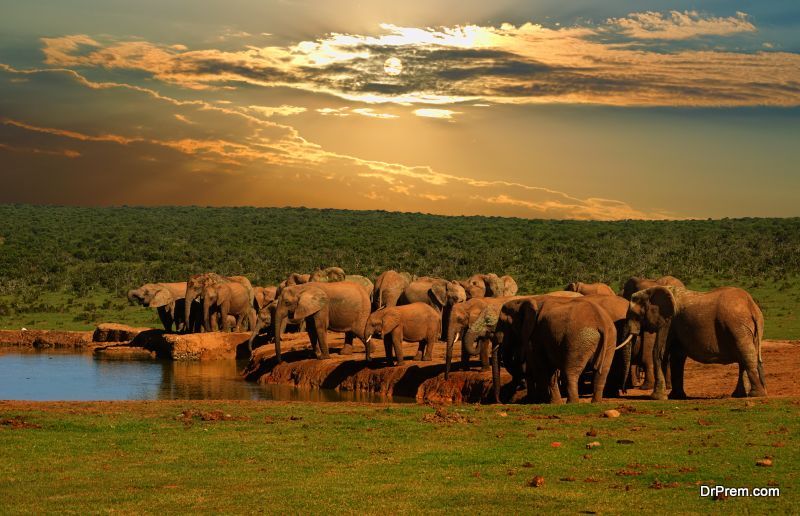Many people consider ecotourism a thoroughly modern phenomenon, and believe that hipsters, who devoted their lives to the study of the environment and are dedicated to the protection of environmental sites and natural wonders, developed it. However, you’d be surprised to know that ecotourism is just a fancy new way of describing tourism as it had been undertaken by travelers before the use of trains, cruise ships and cars was commonplace. We explore the forgotten history of ecotourism.
Complete Guide to ecotourism by Dr Prem – Definition, Importance, Advantages, important destinations and resorts
-
The roots of ecotourism
-
The true beginning of ecotourism
-
The spirit of curiosity
-
Revival of ecotourism
-
Understanding the term Ecotourism and its principles
-
What does the term “ecotourism” mean?
-
The basic principles of ecotourism
-
Why Eco Tourism Matters?
-
What are essential components of eco-tourism
-
EcoTourism Vs Responsive Tourism
-
What is Difference between EcoTourism and Responsive Tourism (Responsible Tourism)
-
Myths and realities of eco tourism
-
Myths of Eco Tourism
-
Facts of Eco Tourism
-
Eco-tourism as a way to attract tourists and inspire them to revisit destinations
-
A chance to payback nature
-
Cultural enrichment
-
Spreading awareness
-
Enjoy local hospitality
-
More adventures
-
What is Eco Tourism?
-
Definition of Eco Tourism by Dr Prem
-
“eco” is new buzz word of the century
-
EcoTourism Vs Mass Tourism
-
What is difference between EcoTourism and Mass Tourism
-
What are key driver of Eco Tourism Growth?
-
What are the prime aims and objectives of ecotourism?
-
How ecotourism is different from sustainable tourism
-
Sustainable tourism covers all kinds of tourism activities and destinations
-
Ecotourism reaps more economical benefits than sustainable tourism
-
Ecotourism is more exploratory in nature
-
Sustainable tourism focuses more on making tourists’ travel and stay zero- or low-energy
-
Traveling Green: Luxurious and sustainable
-
What are benefits of Eco Tourism?
-
Risk in Ecotourism
-
Delving deep the advantages and disadvantages of ecotourism
-
Advantages of Eco-tourism
-
Disadvantages of Eco-tourism
-
Degradation of Environment
-
Travel impact on the environment and ecotourism destinations
-
Destinations
-
Eco-friendly destinations that should feature on your vacation plans
-
Top destinations around the world that are eco friendly
-
Guide to top 10 ecotourism destinations in Europe, Americas and Asia for a new experience
-
The top ten ecotourism destinations of the Americas are discussed further
-
Top 10 Asian travel destinations every eco tourist would love to visit
-
Five Best Eco-friendly Trekking Destinations
-
Is Oman the new destination for eco-tourism?
-
The unexplored Oman’s bio-diversity
-
Hotels, resorts
-
11 most eco friendly hotels of the world
-
7 Unique and Inspirational Eco-Friendly Hotels In The World
-
Important things you should consider as an eco tourist
-
Do’s and Don’ts During Ecotourism
-
Tips to make your travel as green as possible
The roots of ecotourism

If you skip the period of history in which man used trains, cars and ships to travel, you’d find that travel and tourism has been eco-friendly throughout human history. In the olden days, people traveled to places of pilgrimage or tourism on horseback, in animal-pulled carriages, human powered boats or quite simply on foot. This kept the environmental impact of tourism and travel extremely low.
The true beginning of ecotourism
Even though travelers have been visiting exotic locales since time immemorial, ecotourism didn’t begin in all earnest till Victorian times. This was the time of unprecedented prosperity for the nobles and privileged class of Britain and Europe in general and exotic colonies were the preferred destination for these early ecotourists.
In fact, Victorian British travelers are responsible for putting many popular destinations on the tourists’ map and it was they who made traveling to exotic natural destinations popular. Through the travel writing of Victorians, the public became aware of the natural wonders of the world. Exploration, even if it was for the purpose of conquest, exploitation and imperialism, ensured that many natural wonders came to be known to the western world.
The spirit of curiosity

Earliest ecotourists were not so much motivated by the preservation of natural wonders as they were by the spirit of curiosity. You have to remember that this was a time when information about natural wonders and natural sites was really scarce and one had to rely entirely on the accounts of previous travelers (if any and they too were prone to exaggeration and fictionalizing) and local legends to get to destinations. However, once these relatively wild areas were explored, they were put on the map after which noblemen and women began frequenting them more often. This led to the construction of lodges and roads and subsequently of train tracks.
Revival of ecotourism
Ecotourism was all but forgotten in the modern world until travelers began frequenting natural sites in places like Nepal, Ecuador and Costa Rica in the early 1980s. Most of the earliest ecotourists were undoubtedly hippies but their influx into these countries with plentiful natural beauty led to ecotourism being taken seriously. As these ecotourism sites experienced an economic boom, environmental groups raised their concerns about the impact of tourism activities in these regions. This led to the formation of stringent policies about environmental impact of tourism and policies about conservation were put in place and ecotourism began in all earnest in modern times.
Understanding the term Ecotourism and its principles

Ecotourism has become something of a buzzword with international travelers in the last four decades. Even the jetsetters are open to trying to be as less impactful in tourism spots with delicate ecosystems which actually help these ecotourism spots create a healthy tourism economy without destroying nature’s bounty in their region.
What does the term “ecotourism” mean?
The term “ecotourism” itself came into being in 1987 and in 1991 it was defined as a responsible way to travel through natural regions without damaging the environment of these locales or disturbing or altering the existing way of life that locals living in the region. TES (The Ecotourism Society) has been working hard to get ecotourism to gain credence as a legitimate philosophy around which tourism can be developed. TES is also the agency responsible for laying out a number of principles that a region, country or tourism destination must adhere to if they want to promote themselves as an ecotourism destination.
The basic principles of ecotourism
 1.Avoid damage to the natural state of the destination
1.Avoid damage to the natural state of the destination

The most basic principle of ecotourism is that it should ensure that tourism activities don’t destroy of harm the existing cultural and natural environment of these destinations.
-
Traveler education
Ecotourism seeks to educate travelers about the value of conservation of protected natural areas and the role that they can play in ensuring that these destinations remain protected for posterity.
-
Redirection of tourism revenue to conservation

A core principle of ecotourism is that a big chunk of its revenues need to be redirected to the management, protection and conservation of protected areas and regions.
-
Economic benefits to local communities
People living near protected areas also need to benefit from the revenue generated from ecotourism to make it more lucrative to locals.
-
Planning for sustainable growth of eco-tourism
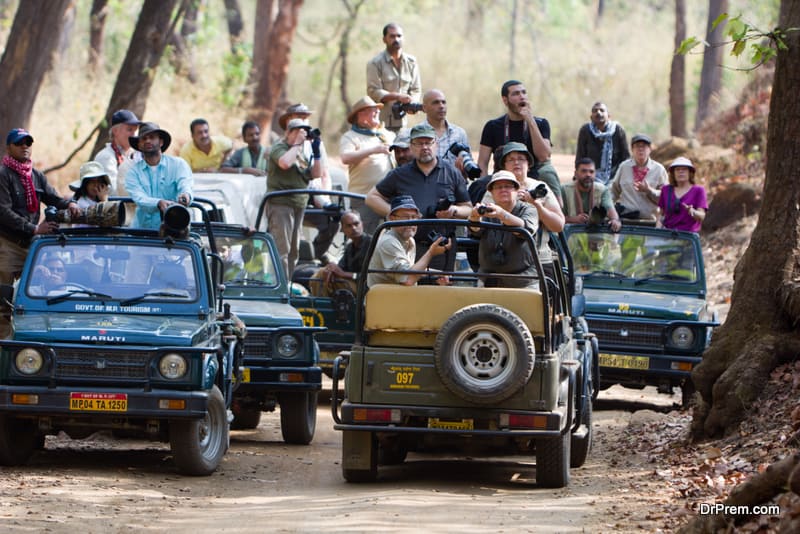
It is important for ecotourism destinations to ensure that the “growth” they need to make in such locations to facilitate an increase in tourist influx does not exceed the capacity of the environment and the society that exists there already. Sustainable growth needs to be preferred and plans for development of such sites need to be made accordingly.
-
Retention of revenue in host country
Ecotourism also places a great deal of emphasis on ensuring that the economic and financial benefits of such tourism-generated revenues are retained by the host country. To do this, governments ensure that locally owned businesses and facilities are given priority over international or multinational businesses.
Why Eco Tourism Matters?
The fundamental of Ecotourism is not only to travel to natural areas but it implies several other factors. It emphasizes:
- Reduction of consumption of natural resources or optimum use of natural resources
- Maintaining diversity of nature and culture
- Integrating tourism into planning
- Uplifting local economies by bringing foreign exchange
- Involving local communities through tourism
- Creating jobs and thus reducing crime
- Reducing poverty by engaging local people
- Marketing tourism responsibly towards the environment
- Researching on effect of human activity on ecosystem
- Maintain humanity and respect for local culture, communities and environment
- Participating public for natural conservation
- Training local and other people who are engaged in ecotourism
What are essential components of eco-tourism
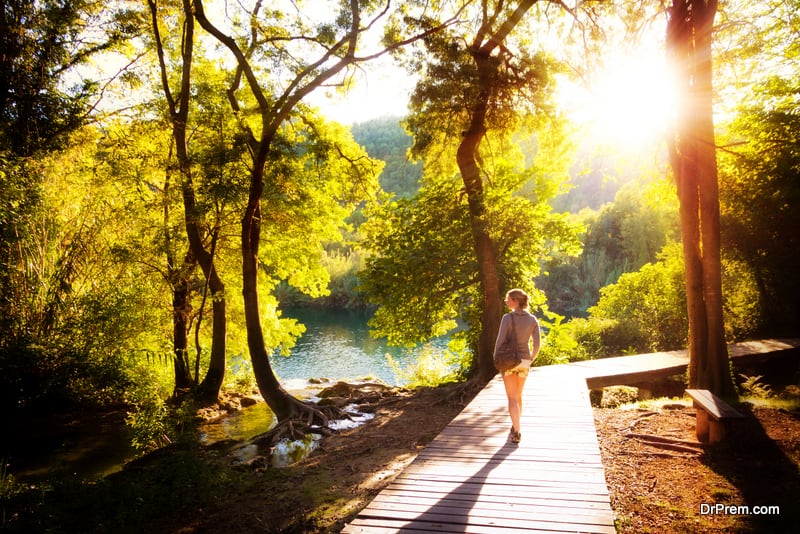
- Should Involve travel to natural destinations
- Should Build environmental awareness
- Provides direct financial benefits for conservation
- Should increase conservation of biological diversity and cultural diversity through ecosystem protection
- Promotion of sustainable use of biodiversity, by providing jobs to local populations
- Tourism to unspoiled natural resources, with minimal impact on the environment being a primary concern.
- Minimization of tourism’s own environmental impact
- Affordability and lack of waste in the form of luxury
EcoTourism Vs Responsive Tourism
What is Difference between EcoTourism and Responsive Tourism (Responsible Tourism)
Responsive tourism creates awareness among people that life on earth is interrelated with each other and we must treat the environment conducive for living for all the creatures. Responsive tourism not only concentrates on foreign exchange earnings but motivate people for meaningful interaction and participation of local community with the people of rest of the world.
Ecotourism is a kind of environmental friendly tourism. When responsiveness is applied to ecotourism then it becomes responsive tourism.
Ecotourism is bounded with travel to natural areas but responsive tourism should be applied to all form of tourism. Responsive tourism teaches travelers that we should not do any action harmful for nature, culture, architect and other driver of tourism. Ecotourism is purposeful travel to ecological environment and responsive tourism serves to meet that purpose.
Myths and realities of eco tourism

Are you interested in eco-tourism? Have you heard lots about this comparatively newer form of tourism but want to know the true facts? Well, this article is exclusively for you. Here are some common myths of eco-tourism and the actual facts behind them. Go through them:
Myths of Eco Tourism
You might have heard a lot about eco-tourism. But is everything right? Well, here are some myths that are prevalent in the industry:
- Being ‘eco’ or environmentally friendly tourism, it seems to be very dull and boring to many travelers. They believe that it is all about roaming around and there is no proper as well as sufficient arrangement of lodging and dining. It is also thought by many travellers that they have to compromise with the standard and quality of their accommodations or foods. In short, the entire trip appears to be the wastage of money to them.
- While many people consider eco-tourism as ‘below par’, there are some individuals who think that it is much more expensive than regular trips. According to them, eco-friendly alternatives that need to be used during the tour often come at higher prices, which makes the entire journey a costly one.
- Another common myth for eco-tourism is that it is highly complicated. Though the industry is growing at a rapid pace, people are yet to get familiar with the entire concept. As a result, it is thought that becoming a responsible eco-tourist, planning a complete environment-friendly tour, exploring the nature in a sustainable way, everything takes a lot of knowledge and time.
Facts of Eco Tourism
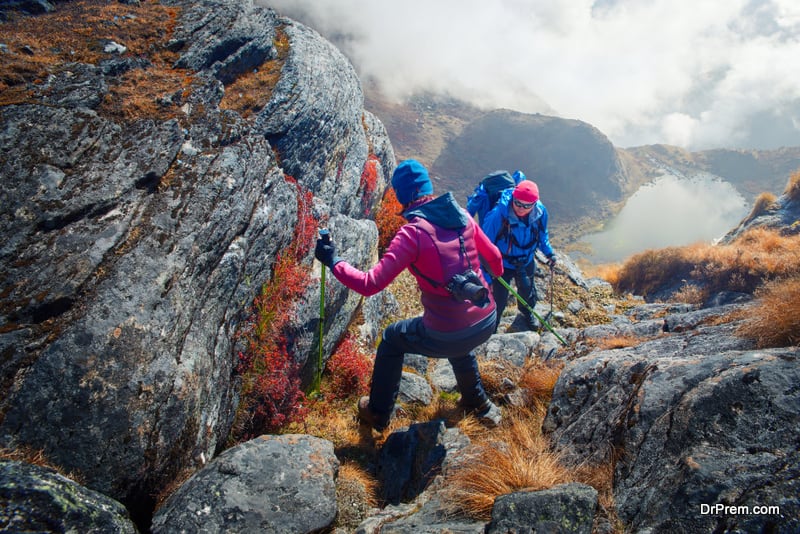
Well, we have told about the myths that are associated with eco-tourism, But how true are those? Let us have a look at the original facts:
- There are several tourist destinations which are famous for eco-tourism. You will find a number of luxurious hotels, resorts, and lodges there, and all of those offer high quality guest services with luxurious amenities. Hence, there is nothing to worry about your comfort level throughout the trip.
- No matter how high the standard of your environment-friendly trip is, it will never burn a hole in your pocket. Depending upon the wish and choice of tourists, various travel and tourism enterprises offer a wide range of prices. You can choose as per your requirement.
- With the advancement of technology, planning an eco-friendly trip has become much easier these days. What you need to do is to browse through the internet and find out the most suitable place as well as a well-known service provider.
Eco-tourism as a way to attract tourists and inspire them to revisit destinations
Eco-tourism is one of the newest branches of tourism industry that has become popular. There are several different reasons for its popularity. The trends of traveling have changed with time. People are no more satisfied with simple beach vacations and hillside holidays. They want more out of their trips and tours.
Modern travelers are more conscious about the environment and want to give back what they have taken from nature. Eco-tourism gives them the opportunity to learn new things and indulge in new expeditions. It also helps them volunteer for conservation of natural heritages and properties. Travelers are interested in revisiting places where they had enriching experiences and derived mental satisfaction. In the following, some of the reasons have been stated that makes eco-tourism destinations so attractive.
A chance to payback nature

The modern eco-conscious generations of travelers are interested in giving back nature something in return of what it has given us. We owe our lives to Mother Nature and can never fully repay her but eco-tourism creates opportunities for showing our gratitude. Eco-tourists enjoy their role as saviors of natural wealth and participate in activities that help in the conservation of nature.
They can help in boosting the recycling drives and clean the beaches. Many eco-tourists devote days or weeks for doing volunteering work for the conservation of natural habitats and the eco-systems.
Cultural enrichment
Eco-tourism brings the travelers in closer and more intimate contact with locals. They get many opportunities of mingling with the native communities and learn all about their traditions, customs and culture. The locals sometimes arrange special festivals or programs to show the cultural splendor of their community through dance or music.
Such close association with people of an exotic community can be very enthralling and exciting. People go back often attracted by the lifestyle and habits of the natives of eco-tourism destinations.
Spreading awareness

Eco-tourists who enjoy their visit to a particular location go back there again with friends or family members. They share the stories of their adventures with friends along with pictures via social media sites and spread awareness about the destination and the conservation work going on. As a result, more tourists flock to these destinations and become conscious about the importance of sustainable and responsible tourism. Eco-tourism is bringing a slow but steady social revolution by making people more aware about the importance of nature conservation and acquainting them with the underprivileged human communities.
Enjoy local hospitality
The young generations of tourists are interested in sleeping under the starry sky and challenge their endurance in different environments. They are more open to living with the local communities and accepting their hospitality instead of booking luxury resorts. This way the local communities are earning wages for sustaining a better lifestyle. The eco-conscious tourists feel responsible for the life of native dwellers and get to enjoy the real flavors of the destinations.
More adventures

Guided tours in commercial tourist destinations are not as invigorating and exciting as eco-tours. The eco-tourists can enjoy several different activities. They can swim with huge, hundreds of years old turtles or cute sea lions and feed baby elephants. They can also learn new skills like paragliding, snorkeling and sea diving.
New adventures and skills make eco-tourism more attractive. People come back more than once to enjoy the exclusive experiences and create more memories to take back home. Traveling to eco-tourism destinations teach the travelers about the importance of certain flora and fauna species. The knowledge they acquire makes eco-tours more satiating and necessary for self-development.
Eco-tourism is more than just a fad or trend. It is a life enriching experience and for some it is a lifestyle choice.
What is Eco Tourism?
The term Ecotourism is not new thing in human experience and it has been practiced in most developed and developing nation. There are numerous definitions of the term, but according to American-based Ecotourism society, Ecotourism is nothing but a purposeful travel to natural areas; to understand the nature and culture; to understand the effect of human interference in ecosystem; and ultimately produce economic opportunity to conserve natural resource which is beneficial to local people. I do not know how far one is justified, calling it the pivot or corner stone of progressive tourism. Ecotourism demonstrates the need of conservation of both cultural and natural environment with sustainable economic development including the participation of local people.
Progression of civilization has been harming ecosystem and now people are forced to live in a concrete jungle. At present time, people are searching places full of nature and diverse cultural experience. Ecotourism; therefore promotes tourism practices where we can enjoy nature-experience and help local people and their culture through economic development. It not only gives us places to feel the nature but it also teaches about sustainable use of resources, negative impact of human activity on environment, economic viability of tourism for local communities and responsibility towards the environment. Thus Ecotourism is defined as the “Responsible and purposeful travel to natural and cultural areas that conserves the environment and improves the well being of local communities”.
Definition of Eco Tourism by Dr Prem

Responsible and purposeful travel to natural and cultural areas that conserves the environment and improves the well being of local communities.
“eco” is new buzz word of the century
Realization of the impact of human activity on environment opened the eye of people to embrace ecotourism. Eco is now new buzz word of the century. Now people are talking about eco-friendly cars, eco-cards, eco-tourism, eco-friendly houses, eco-friendly hotels etc.
Eco is immerged with ecosystem which is the pure form of nature where there is not interference or human activity on environment. Climate change has an adverse impact on the livelihood of humans and other living creatures. International Food Policy Research Institute (IFPRI), 25 million will be malnourished till 2050 due to effect of climate change. Thus the Eco-friendly environment can only protect the human survivals.
EcoTourism Vs Mass Tourism
What is diffrence between EcoTourism and Mass Tourism 
Ecotourism is defined as travel to relatively unspoiled locations and emphasizes mankind to do little impact on ecological condition. Unspoiled location is nothing but an area with little development and full with nature and requires to be conserved using certain laws.
Mass tourism, on the other hand, demands high volume of visitors to a tourist place and made with possible modern advancement, modern transportation system and modernize market. Thus mass tourism contradicts ecotourism because large number of visitors destruct the ecosystem that area and have great negative impact. Mass tourism demands modern infrastructure which is not possible without spoiling natural environment.
What are key driver of Eco Tourism Growth?
a. Awareness about sustainability
b. Preservation of natural resources and landmarks
c. Global transportation improvement
d. “Eco” is new buzz word of the century
What are the prime aims and objectives of ecotourism?
Eco tourism or sustainable tourism is designed to make travelers aware of the environment and carry out all tourism operations in an eco-friendly manner. We have listed down a few aims and objectives of ecological tourism. Have a look:
What are the prime aims and objectives of ecotourism?

Maintaining the Sanctity of the Environment
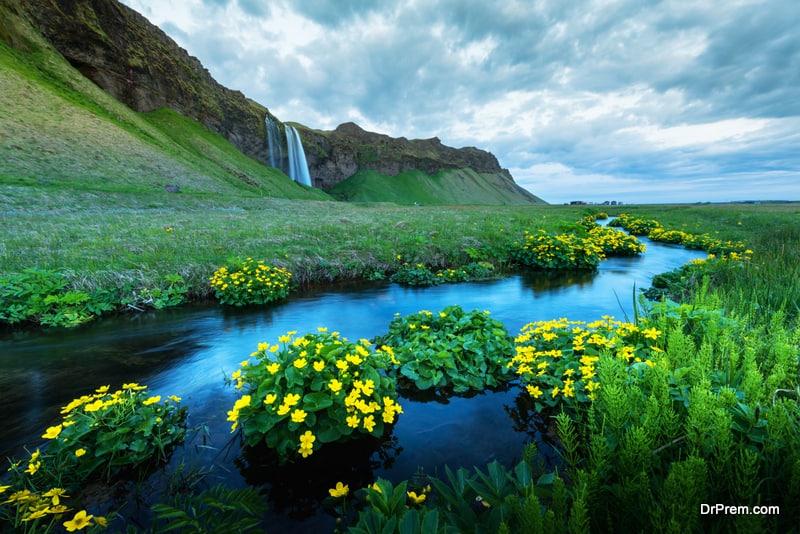
As the name suggests, this special type of tourism revolves around the surrounding environment or ecology. Hence, one of the major objectives of this practice is to reduce the levels of pollution (air, water, noise, land, etc.) resulted from the whimsical uses of resources by travelers. It is important for maintaining the purity of the environment.
Utilizing All Types of Resources Efficiently
With the inception of eco tourism, people have become more conscious about the effective and efficient use of both renewable as well as non-renewable sources of energy. The idea of sustainable tourism is closely related to the conservation of scant and non-renewable resources that are used in the tourism industry. On the other hand, it also encourages the maximum use of renewable energy sources.
Preserving the Biological Diversity

When it comes to eco tourism, the significance of preserving the ecosystem can never be ignored. Enterprises offering services in this field are known to put continuous efforts in upkeeping the biological diversity of different tourist destinations. They try to lessen the extent of damage caused by travelers to the nature and the wildlife in a sustainable way.
Ensuring the Economic Progress
Ecological tourism has become one of the most viable economic options for the worldwide tourism industry. So, another significant aim of this sustainable form of tourism is to facilitate the feasibility of various destinations and increase the competitiveness of different enterprises associated with the sector through it. It helps those organizations flourish incessantly and deliver long-term benefits to the travelers interested in eco tourism.
Increasing the Scope of Employment

With the raid progress and development of the eco tourism industry, the scope of employment is also going up. The demand of trained individuals to provide services in hotels, resorts, retail shops, etc. is increasing day by day. Hence, another objective of this type of tourism is to generate ample job opportunities for local people irrespective of race, sexual category, capability, and so on.
Strengthening the Cultural Bonding
Eco tourism opens up a complete new horizon for the tourists as they get to know about several places and their people. It gives them a chance to explore the local culture, traditions, customs, lifestyle of the habitats, authentic cuisine, and many more, which eventually make the cultural bonding stronger among various countries.
How ecotourism is different from sustainable tourism
Ecotourism is a popular new concept within international traveler communities who seek out exotic locales that are famed for their unique ecological beauty. Sustainable tourism is also a buzz word that has popped up on the travel scene of late though many people confuse the two terms often. We explore the differences between ecotourism and sustainable tourism.
Sustainable tourism covers all kinds of tourism activities and destinations

Ecotourism is a term applied to travels that take tourists in and around a particular protected environmental destination like a nature reserve. Ecotourism focuses on allowing tourists to visit these sites without the least amount of damage or impact. Sustainable tourism, however, on the other hand is a kind of travel that seeks to minimize a traveler’s carbon footprint and reduce the environmental cost of traveling to all kinds of destinations. The term sustainable tourism is applied to using sustainable travel options like green electricity run trains and cars instead of airplanes, living in zero- or low- energy hotels instead of posher but more polluting hotel chains etc.
Ecotourism reaps more economical benefits than sustainable tourism
Sustainable tourism may be the hottest new buzzword in the industry but it is still in its infancy and its economic benefits are still to be ascertained. Ecotourism however, is focused more on allowing tourists to visit natural wonders of the world which reaps immense economic benefits to countries without the need to invest too much in terms of infrastructure development in and around these sites.
Ecotourism is more exploratory in nature
Sustainable tourism simply deals with living sustainably and opting for green travel options during travel. Ecotourism on the other hand allows tourists to explore a natural site. For example, if you were staying in a tent on a beach and using harvested rainwater and no throwing any plastic trash around your campsite, you’d be traveling sustainably. But if you were traveling through, say a game reserve in Africa, you’d be indulging in ecotourism.
Sustainable tourism focuses more on making tourists’ travel and stay zero- or low-energy

Quite simply put, sustainable tourism is all about making regular tourism more environmental friendly. This would include stays at hotels that have adapted strict measures to reduce their emissions, using green travel options like bicycles, electric cars and electric trains, restricting the use of plastics around tourism destinations and prohibiting activities that are damaging to the environment.
Traveling Green: Luxurious and sustainable
If you thought that traveling green or celebrating sustainable holidays could be boring, then you are wrong! Environmentally friendly holidays are the need of the hour. And endless incredibly innovative options make sustainable travel experiences more interesting.
One cannot deny the fact that tourism is a major contributor to any economy, but at the same time it cannot be argued that travel industry contributes considerable amounts of pollution and waste. Thanks to growing eco awareness, many people are willing to try sustainable tourism options to save the planet; however, a lot more people are simply curtailing their holidays because they believe that traveling green is too expensive and heavy on their pockets. Yes, it is true that most of the green travelers prefer luxury and avoid taking actions on personal levels, thereby opting for costlier alternatives like greener hotels, sustainable airlines etc.
Here are some of the luxury trends that help saving the environment in long run.
1. Structurally sustainable

Image Source : greatsmallhotels.com
Eco conscious travelers now seek luxury as well as sustainability while opting for their hotels. Therefore, they seek hotels which are having a pure, raw and unadulterated form of aesthetics. Hotels like Sleeping Around, which is operational since January 2013, features shipping containers that have been transformed into hotel rooms and use sustainably sourced furniture and items. Similarly, the Eco-Resort Pedras Slagadas has cabins that camouflage with woodland environment in the North Portugal. The cabins are designed to complement the sizes and gaps between trees. This also inspires interaction between guests and the park.
2. Living Hotels
It is true that with guests and travelers, most hotels are literally ’living.’ However, some hotels take this to a newer level by introducing greenhouse keeping operations and sustainability programs. Some of them even go bolder and opt for extending the hotel in beautiful, living ways by using plants, flowers and terrace gardens. For instance, the National Hotel near Beijing Airport would supposedly have 107,000 foot of indoor rainforest that would be connected to energy efficient solar thermal pipes for heating purposes. Similarly, B3 Hotel Virrey in Bogota has eight storeys of living walls, as the exterior of the hotel features over 25,000 plants insulating the hotel and reducing pollution.
3. Embedding sustainability

Some of the hotels even invite their guests to participate in their green crusade. For instance, in the Cottage Lodge Bed and Breakfast lodge in Hampshire, travelers who wish to watch television need to do it via pedal power. The hotel also has solar powered rooms.
Nevertheless, apart from industry-oriented actions in luxury travel sector, travelers can take personal actions to ensure that their traveling is more sustainable and responsible. Moreover, these eco-friendly initiatives will also help them save some bucks in the long run. For instance, use water sparingly, reuse your water bottles, avoid littering, use public transport, save electricity and avoid leather products, especially the ones outsourced from endangered animals.
Certainly, with the rising demands for sustainable tourism, the luxury travel sector has made several attempts to make traveling more responsible and make eco travelers the champions of eco-friendly traveling.
Why Eco Tourism Matters?
Affordability and lack of waste in the form of luxury

People dispose large amount of waste to maintain luxury and do unwanted activity to create affordability of technological products. People should minimize the use of luxurious product to protect ecosystem and promote ecotourism to get new experience of affordable and clean environment. So a responsible travel out of luxury is required to conceptualize real ecotourism.
Minimization of tourism’s own environmental impact
Tourism has its negative impact as well on environment. Hotels and other infrastructure advancement to promote ecotourism has an adverse effect which can be minimized by recycling material, by suing local building materials, by using renewable sources of energy, by safe disposal of waste and water and by protecting cultural architect including environment. There should be regulation formed by local government which ensures limited damage to local ecosystem, proper behavior towards to local culture and sustainable use of resources.
Tourism to unspoiled natural resources, with minimal impact on the environment being a primary concern.
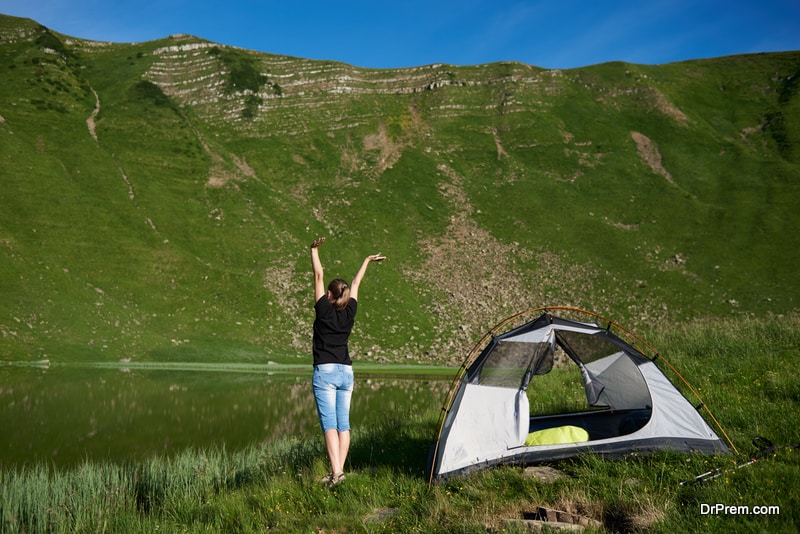
Ecotourism concept immerged with a view to giving travel plan to natural areas which brings development in nearby area and development of local community. Natural resources have been used by mankind for its own development and thus destroyed the ecosystem of the developed area.
Environment is not conducive for human beings and other living animals to live. Thus ecotourism plays a crucial role in teaching humans to protect the environment through minimal use of natural resources, preservation of local ecosystem and reduction of human activity on environment.
Promotion of sustainable use of biodiversity, by providing jobs to local populations
Sustainable use of natural resources and conservation of national park will only be possible if nearby people are happy. Happiness comes when people get out of poverty level and this ecotourism brings income and other intangible benefits (water, roads, health etc.) from the conservation areas. Hotel, restaurants, tour guide services, lodges and other shops can be developed with the help of surrounding communities and other tourist destination from the rest of the world. Above all increase the job opportunities for local people and thus become a tool for rural development. Ecotourism also help to empower local community, village, cooperative and entrepreneur in economic and political front. Viability of sustainable use of biodiversity is possible if foreign operators and partners set the economic equation by providing support to the local community through connecting people into jobs.
Should increase conservation of biological diversity and cultural diversity through ecosystem protection
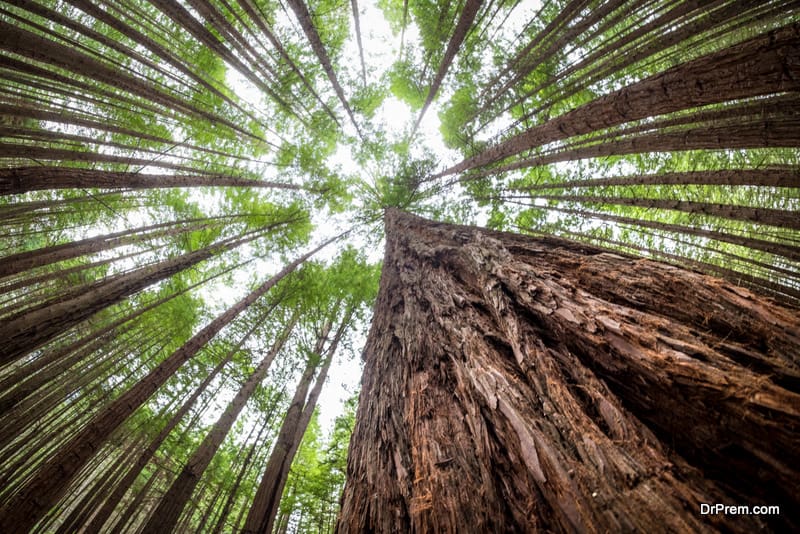
Every animals, plants and human being forms bio-diversity which is essential to maintain food cycle. There are endangered species which we have to protect because they are somehow correlated with our ecosystem. We also have to conserve forest which brings rain and maintain oxygen level necessary for living creatures. Conservation of biological diversity is essential to reduce poverty. Cultural diversity is also important to conserve because culture has been developed based upon local ecosystem. Thus protecting local ecosystem actually protects the culture of that area. Based on ecological environment, people adapt themselves and establish their culture accordingly, grow grains according to environment, increase living pattern accordingly. All the species including human make the earth inhabitable for all and is directly supports 40% of world’s economy, particularly in sectors such as forestry, agriculture. 70% of world’s poor live in remote rural areas and depends directly on biodiversity for living and survival.
Provides direct financial benefits for conservation
Ecotourism is a kind of business which raised funds through foreign exchange and its help the nation to protect the environment, to do research for its preservation and to conduct education within the system. The funds comes through variety of mechanisms, including hotels, airlines taxes, local transportation, local jobs, parking fees, tour package and voluntary contribution by developed nation.
Should Builds environmental awareness

Environment is made from living and non-living things. Fresh air, water, soil, etc are basic requirement of all living things which is being polluted because of industrialization and human destruction of nature. Until and unless people understand the impact of human activity on environment and its cause, the real ecotourism concept cannot be developed in the mindset of the travelers.
Ecotourism not only educate tourists but the residents of local communities as well. Tour operator should provide reading material to the visitors about the ecosystem of the country, its environment, its people, its culture and code of conduct. This information minimizes the impact of tourist activity on local sensitive environment and local culture. Tour guide should be well trained and should have multilingual skill to guide travelers about the local environment and culture, ethical principles and form of communication.
Surrounding community and their children learn through ecotourism about foreign culture, language, and business as a whole. Thus country should educated the students and nearby community about the natural asset and how they become productive for the development of nation, society and itself.
Should Involves travel to natural destinations
People should change their travel plan from the concrete world to natural destination just to find peace, comfortable climate, and eco-friendly condition. These destinations should be remote areas whether inhabited or uninhabited and must be safe on the parameter of environment. Travels to that destination should be out of national, international, communal and private interference.
Preservation of natural resources and landmarks

The theme of Ecotourism is not only to have sustainable use of natural resources (air, soil, minerals, animals, plants and water) but it teaches us the importance of preserving those resources for our coming generation.
These natural resources discussed above are not the complete list what we have to preserve but there are non-living things like, historical landmark, beautiful landscape, heritage, culture, religion, aesthetics, peace and calm that also need to be recognized.
Awareness about sustainability
Sustainability is the key to success for every business whether it’s an Ecotourism. There should be responsible ecotourism that can generate economic, social and environmental viability within a sustainable system.
Sustainable system believes in function of the system over long period of time. Being sustainable means using enough of the natural resources to meet our need and conserving enough of these resources to meet the needs of our children, their children after them and so on.
Global transportation improvement

Transportation and communication systems of any nation promote the foreign visitors to experience the ecosystem of that area and it strengthens the global interaction which in turn helps the nation to spread the vitality of ecotourism. Good airports, effective railway system, connecting roads to scenic areas, easy accessibility of tour visa for foreigners, network with other global transporting system plays a crucial role in carrying travelers across the globe to that ecotourism place.
There should be good road infrastructure, connected with cities and towns so that visitors visit the area properly and in safeguard their tour plan. Coach services, ferry services are other transportation tools which are essential for development of ecotourism business within the nation. Most of the countries are connected with sea link and thus establishing sea link to the seaports of other countries encourages tourist flow within the nation.
What are benefits of Eco Tourism?
- Benefits to individual
- Benefits to environment
- Benefits to Eco Community
- Benefits to promoting nation
- Respects local culture
- Provides financial benefits and empowerment for local people
- Sharing of socio-economic benefits with local communities and indigenous peoples by having their informed consent and participation in the management of ecotourism enterprises.
Benefits to individual

Ecotourism bring jobs with itself for the local individuals and job increases the living standard of the individual and thus reduces crime in the society. With the addition of ecotourism concept in the society, people are taking interest to know the biodiversity and different culture around the world. South Africa is known for ecotourism and the total number of tourist arrived there in year 2010 in 9 months were around 6 million, increase of 17% from the period 2009. 63 million people visited South Africa from 2003 to 2009. Arrival of tourist is directly related with the job of individual in local economy. While traveling, visitors use local accommodation, eat local foods, drink, enjoy local entertainment and buy gift for their belongings. One in every 14 jobs is created by world tourism, injecting around US $ 5,000 billion foreign exchange into the international economy every year. In one way local individuals are getting jobs and in another way they understand foreign culture and their living standard.
Benefits to Eco Community
With the introduction of Ecotourism, local community started flourishing with the help of the inflow of foreign exchange. Foreigners require help from local community in traveling to local areas, for foods and other items. In exchange local community gets money, involvement with foreign culture, and learning to protect environment. They are connected with rest of the world in the path of sustainable growth and thus reduce poverty within the community by aligning themselves with ecotourism concept.
Ecotourism connects the local community in business environment through an understanding of how to get training and employment and how to channelize the buying and selling local supplies and services. The benefits of all ecotourism operation thus support the local community to conserve the eco- assets.
Provides financial benefits and empowerment for local people

Local people started earning money thorough ecotourism and that earning they spend to gain empowerment. Ecotourism let them understand that the local ecosystem is an asset for them and these assets can be used to earn money through which local people align with rest of the world in term of buying foreign goods and lifestyle.
Benefits to Environment
We are beginning to realize the effect of human activities on environment. Ecotourism promotes maintaining ecological process such as recycling of nutrients, soil conservation, reducing pollution, and wildlife management, purification of water and sustainable use of natural resources. Environment also constitutes humans and animal which maintains the bio-diversity.
Ecotourism protect the endangered and vulnerable species through forest conservation and cultivated plantation for domestic animals. Scientific and industrial progress depends on genetic diversity which we learn by traveling eco-friendly environment. Ecotourism ensures proper ecosystem constituting forest, wildlife, grazing lands, and local culture.
Respects local culture

Ecotourism not only teaches the foreign visitors about local culture and etiquette but local residents in turn learn the same thing from them. Foreign visitors observe the ecosystem of that area and feel the great empathy with the experience. Local people on the other hand learn how to satisfy the need of foreign expectation and gain additional knowledge different from their own natural experience. So in this way, ecotourism form a peace in society that promotes respects for other cultures and safety.
Risk in Ecotourism
What are potential risk in Eco Tourism?
Number of tourist adversely affects the visiting areas as well if there is no proper management and laws to protect the environment and culture.
-
Financial and Economic Risk
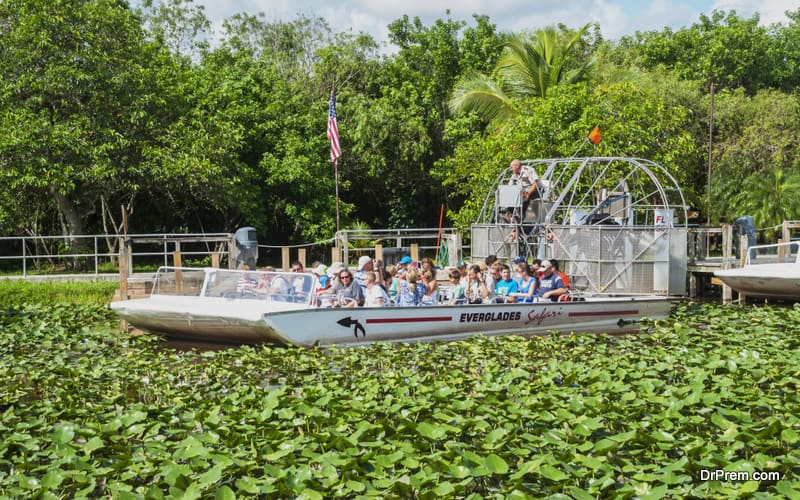
Like any other tourism, ecotourism also brings demand for goods, services and facilities for visitor and it increases with the increase of its popularity. To meet the demand of increasing number of visitors to the ecological areas increases basic services, foods, and other requirement increasingly. As a result rich and wealthy foreign visitors take control of local business which leads to foreign ownership of land of property. Above all minimizes the value of ecotourism.
-
Social Risk
Increased numbers of visitor from all across the world may disturb community activities and other services served by local people. Unplanned development then leads to congestion of population, littering, vandalism and crime in the society. Local tradition becomes commercialized on the other hand which leads to loss of their integrity and authenticity. As for example, local folk dance now becomes a means of entertainment for the tourist and visitors. Local communities are sometimes do things according the foreign authority and thus lost the control over the tourist involvement economically and culturally. Negative effect is also seen in their culture which is changing with the popularity of ecotourism and thus it’s important for the nation to make acceptable rules and guide travelers to conduct a responsive tourism. Exploitation of local community, their lifestyles should be taken into consideration and ensures development align with the development of local people and local culture.
-
Environmental Risk
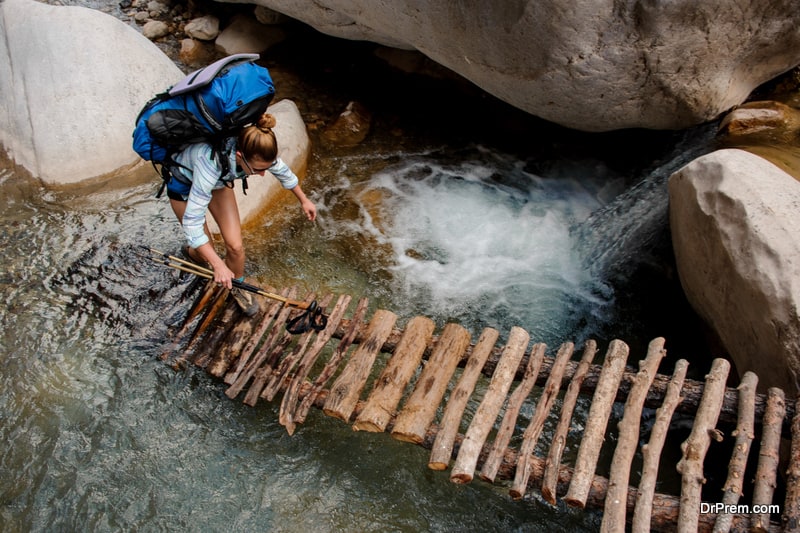
Environment of unspoiled location become spoil with the development of ecotourism. Development in local economy leads to human activity on sensitivity of nature and destroys the preexisted ecosystem and change the climate condition as a whole.
Delving deep the advantages and disadvantages of ecotourism

Eco-tourism or ‘Ecological Tourism’ is a rising form of international tourism. It is intended for promoting awareness about environment among people and facilitating preservation of wildlife. It comes with a number of benefits and pitfalls as well. Find below some of those advantages and disadvantages of eco-tourism:
Advantages of Eco-tourism
Preservation of Surrounding Environment:
 The idea of eco-tourism revolves around visiting beautiful places and protecting environment through it. As it does not involve the exploitation of several natural resources for unsustainable gains at a rapid pace, significant negative impact on the environment seems to be unlikely. Rather, the nature and wildlife can be preserved, which offers a sustainable choice of earning to the local people from travel and tourism.
The idea of eco-tourism revolves around visiting beautiful places and protecting environment through it. As it does not involve the exploitation of several natural resources for unsustainable gains at a rapid pace, significant negative impact on the environment seems to be unlikely. Rather, the nature and wildlife can be preserved, which offers a sustainable choice of earning to the local people from travel and tourism.
Provides authentic tourism experience
Authentic experience is at its best in ecotourism and today’s travelers eagerly look for it. They could get nearer to the nature and become more aware of its value and importance. As eco-tourists, they develop respect for nature and take responsible measures to preserve it. Once this awareness sets in, they tend to practice responsible tourism wherever they go and spread awareness to fellow tourists as well.
Boosts research and development
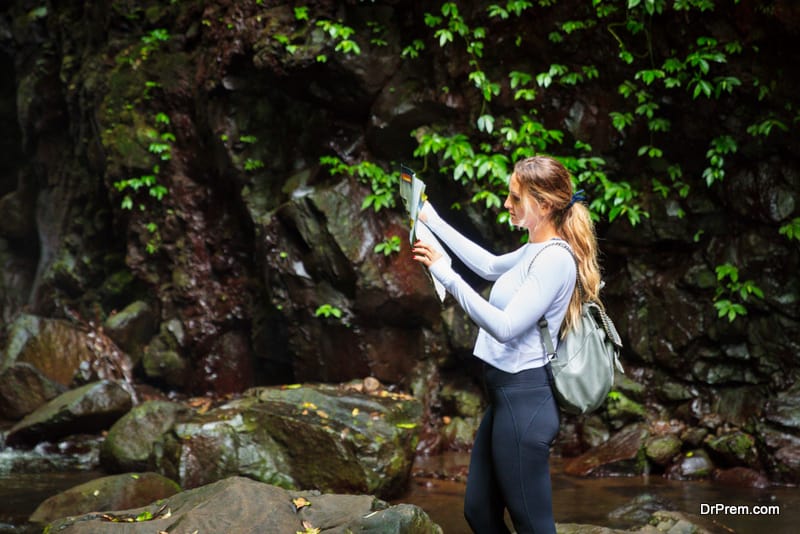
People get the scope of enhanced research and development regarding better environment management practices and create provisions to uplift the local community. By observing nature from close quarters, they can device better ways of environment protection. Not only the environmentalists, scientists too can gather important biological information leading to a better understanding of the conservation practices and creating more natural habitats.
Scopes of Employment for Local People:
The eco-tourism industry is seeing a boom as the concept is getting much popular with each passing day. More and more job opportunities are opening up as a result of the increasing demand of hotels, resorts and other accommodations equipped with skilled and trained professionals, experienced tour guides, merchandise retailers selling lots of necessary items, restaurants offering a variety of tasty foods, and so on. It is a great way to boost the local businesses.
Helps in local economic development

Many countries could achieve a sustainable economic growth through ecotourism. For example, destinations like Nepal, Costa Rica, Ecuador, Madagascar, etc rely on ecotourism practices for their economic growth. Through regular tourism, the local communities could manage only 20% of the revenue while through ecotourism they can get 95%. It is for this reason the Madagascar government has included promoting ecotourism in its economic strategy to cut down poverty hoping more employment and revenue generation.
Provides financial support in conservation
A significant portion of the revenue from ecotourism goes to various conservation projects like reforestation, water management, natural breeding of flora and fauna and other rural developmental activities. More the people spend in ecotourism, easier is to run these conservation projects. South Africa’s wild life conservation in national parks runs with eco-tourism revenue. They have to deliver what the visitors pay for.
Protects endangered species

Special protective and conservationist measures prevent endangered species from the brink of extinction. One such example is Africa, the home to countless exotic flora and fauna. Conservation safaris have been protecting the threatened species in the Wildebeest Migration Safari by keeping them out of the poachers.
Deep and Diverse Cultural Impacts:

Eco-tourism is not only about exploring exotic landscapes, taking care of natural resources and enhancing the economy of a certain region. It comes with intense socio-cultural effects. While visiting different places, travelers get to know about local people and their cultures. It develops a sense of much better conservation ethic in them.
Great opportunity to market local products:
Hardly people are aware of the quality local products available in a particular destination. Through ecotourism, locals get the opportunity to showcase their products which normally include edibles and handicrafts and improve their earnings for sustenance. They need not have to travel or hire a third party to sell their products.
Form a cross-cultural bridge between the developed and developing nations:
Ecotourism provides an educational benefit for the foreigners who get a glimpse of the diverse natural and cultural heritage of a destination. A healthy cross-cultural interaction developed with people from different background which can be beneficial for the locals.
Contributes to natural resource management
Exploiting natural resources for business purposes is rampant across the globe. The result is a string of ill-effects that the global population is suffering from. Ecotourism facilitates natural resource management through various efforts of replenishment and recycling. It also helps in developing the habit of judicious usage of natural resources soil, water and air. Gradually, travelers develop a conscientious mindset in sustainable resource utilization.
Ecotourism can be affordable

Compared to the expenses in conventional leisure and pleasure tourism, ecotourism can be more affordable. Tourists seeking budget-holiday trips find this more gratifying and enjoyable. In these locations, you do not always need high-end luxury. With some essential supplies and fewer services, you can enjoy an adventurous holiday within limited expenses. You carry your backpack, tents and use green transport which automatically reduces your travel cost.
Disadvantages of Eco-tourism
Degradation of Environment:

Like all other unique environmental efforts, eco-tourism also has some negative impacts on our surroundings. We might claim to be ‘environmentally sophisticated’, but the truth is that we do not realize how the transportation through which we are traveling or the food / drink which we are consuming there are taking a toll on the nature. All these inadvertent vicious infrastructure accelerate the environmental degradation to a large extent.
Travel impact on the environment and ecotourism destinations
More number of eco-tourists may fetch more dollars but there is a flipside to it. Much of the ecotourism sites are in remote locations not easily accessible. You travel more generating harmful emissions which not only impacts the environment but also the surroundings of ecotourism spots. Green travel modes are highly demanded but all ecotourism destinations could not implement it fully.
Destruction of the natural habitat

Though eco-tourism promotes preservation of natural surroundings, too many tourist footfalls in popular eco-tourism destinations is causing destruction of the natural habitat. Encroachment of the surroundings sets in which gradually leads to the loss of valuable species those are totally dependent on the natural habitat. Many species become endangered. Sound pollution, development of new structures and other tourism activities often aggravate the destruction.
Disturbance Caused to the Wildlife:
Each and every type of tourism interrupts the quiet and peaceful wildlife. Despite lots of promotion of eco-tourism, people do not care much about the inconvenience caused to the birds and animals due to their illogical demands, wishes and behavior. Even if the tourist’s motto is ‘take nothing but pictures leave nothing but footprints’ but the manner in which all these are done is not only disturbing but threatening for the wildlife. They really do not try to become proper eco-tourists. It eventually imposes negative effects on the ecosystem and affects the ecological balance.
For example, tourism activities in Antarctica are disturbing the local fauna disrupting their natural activities and breeding pattern. This is posing a threat to the fragile ecosystem out there. Similar effects are also observed in Costa Rica where monkeys are feeding on the garbage and the selfie-clicking spree of tourists is disrupting the breeding of endangered turtles.
Change in wildlife behavior
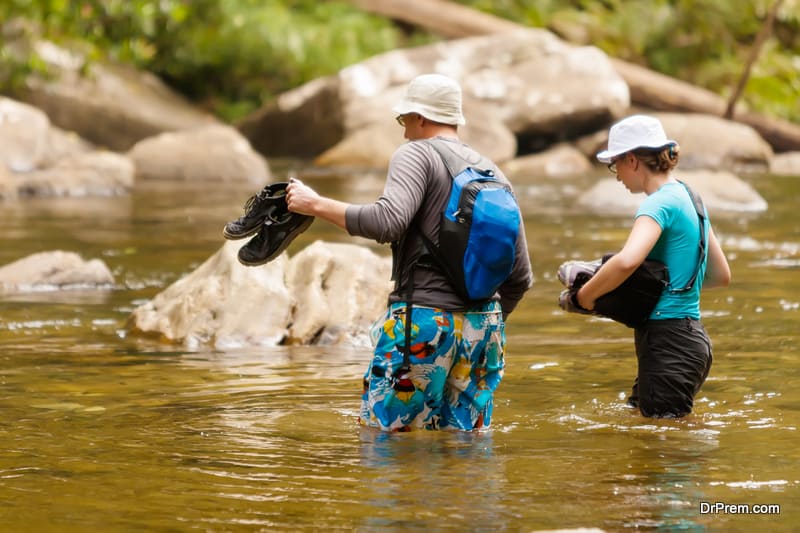
Growing eco-tourism has led to significant changes in wildlife behavior. Wild animals seem to lose their independence and become more dependent on human beings. Despite the good intent of eco-tourists, it cannot be that it will not have any adverse impact. In a study of wildlife behavior in ecotourism spots, researchers found that elks preferred taking shelter in the areas of high-human activity where they felt safe. As a result, they are losing their natural alertness of self-protection from the predators. Even more concerning is this docility can be transferred to successive generations.
The safari business in Africa stands as another big example where marked changes in wildlife behavior are observed. Fast-speeding tourist jeeps scare away the animals that the African predators look for their prey. Lions in Kenya and Tanzania have to change their hunting schedules. They have to wait till the later hours of the day when it is hottest to get their prey.
Interaction with humans makes the wildlife vulnerable to poaching
Frequent interaction with human beings sets in a phenomenon named as “habituation” when the wild life gets used to human interactions. Rising ecotourism fetches 8 million visitors every year in wild life parks and sanctuaries. This makes the animals more vulnerable to poaching. One such unfortunate event that struck the news headlines is of the star African lion Cecil who was poached out of the national reserve by trophy hunters.
Displacement of locals:

The local people are worst hit if they are displaced from their original habitat to make provisions for hotels, resorts and other expansion activities. This goes against the objectives of ecotourism. What is even worse that these people do not get enough compensation for their habitat loss forget about employment opportunities. A notable example is in East Africa where 70% of the National Parks and game reserves have come up through illegal uprooting of the local Masais.
Illegal practices defeat the cause
It is natural for eco-tourists to get excited at the sight of cute and exotic wildlife. This too has some negative implications. To fuel the excitement, locals/guides resort to some aggressive actions like pulling out a reptile or tying an animal to enable a closer interaction with the tourists. Often animals are heavily sedated or brutally tamed to serve various purposes of the tourists. Driven by poverty, locals illegally keep animals to satisfy the tourists. Cages and enclaves in many wildlife sanctuaries are not up to the mark where the animals can be animals.
Compromised land space:
Ecotourism is gaining popularity and to meet the demands of ecotourists undeveloped land is being converted into profitable spaces. Resorts and varied types of accommodation set ups are cropping up disturbing the natural landscape. Too many tourist footfalls are upsetting the natural wilderness.
May harm the indigenous culture:
Intermingling with different people through ecotourism may cause a shift in the mindset of the local community. They may not be able to preserve their culture but borrow unwanted traits through this mixing. Curiosity and the urge for authentic local experience drive towards commercial exploitation. The locals, especially the tribal community, turn out to be the “tourist attractions” along with the flora and fauna. They pose with the tourists in their tribal outfits for a token payment. They put up music and dance performances to entertain tourists and unknowingly give in to exploitation. Driven by consumerism, these communities are shunning their traditional practices. The tourists are destroying the authenticity of the region.
Resource crisis:

The growing trend of ecotourism may create water and energy crisis affecting the marginalized community most. Although ecotourism is aimed at minimizing resource depletion but too much of it can backfire.
Can cause conflict between the tourism sector and locals
The local communities may not be willing to allow various tourism activities in the specified ecotourism spot. Conflict with the locals and tourism agencies is not new. Many a times, they do not cooperate with the tourism development fearing loss of their natural habitat. Often tourism companies are also not willing to employ the locals leading to serious conflicts.
Lack of integrity among ecotourism organizations

It might be encouraging that ecotourism sees 25% growth globally every year but not in the manner as expected. Many organizations are labeling themselves as “promoters of ecotourism” claiming eco-friendly practices or green tourism. It has been more of a marketing ploy to attract the growing ecotourist customer segment than to adhere to ecotourism practices. Littering of plastics and other non-biodegradable items in the so-called rated ecotourism lodges and facilities is a common scene.
It is difficult to conclude whether the advantages of ecotourism outweigh the disadvantages or vice versa. Given the prospects of overall development through eco-tourism, there should be targeted efforts to minimize its negatives.
Destinations
Eco-friendly destinations that should feature on your vacation plans
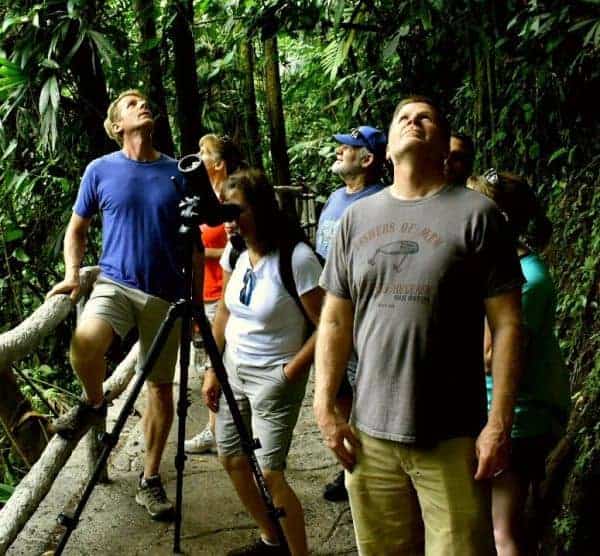
Being eco-friendly is slowly turning out to be every individuals concern. People consider buying eco-friendly cars, and getting the house decorated keeping organic theme in mind. Thinking green is important these days and the same applies for vacations too. More and more people are planning eco-friendly trips. Vacation rental is one such eco-friendly option that can be considered while travelling.
This surely is a good option as compared to hotels, since hotels usually aren’t built keeping in mind environmental concerns. You can see brightly lit hotels, buffet food being thrown away, lack of greenery, air conditioning used everywhere, and other such practices. Here are some destinations that you should consider for your eco-friendly vacation.
The Costa Rica Rainforest
This naturally preserved destination is a great place to enjoy eco-friendly holiday. You will find resources sourced from local shops/farmers and holiday rentals instead of hotels. Moreover, you can feel in the midst of nature by enjoying hikes and treks. It is a perfect destination to merge with nature and enjoy its goodness.
Grand Canyon

A good alternative to enjoy nature friendly holiday is by not using artificially created resources such as electricity or hot water. Grand Canyon is a destination where you can enjoy an adventurous trip hiking the mountains. You will be enjoying this without making use of electricity or burning any fuel.
Death Valley National Park
A perfect destination for bikers, this place is a complete adventure experience. You can enjoy adventures and activities like horse rides in the midst of greenery. On your vacation, also experience salt flats and boulders moving during the night. However, care should be taken to carry your mobile and water. After a long day of adventure activities, you can relax at the cool vacation rentals. You can enjoy this destination through horse rides too.
Everglades National Park
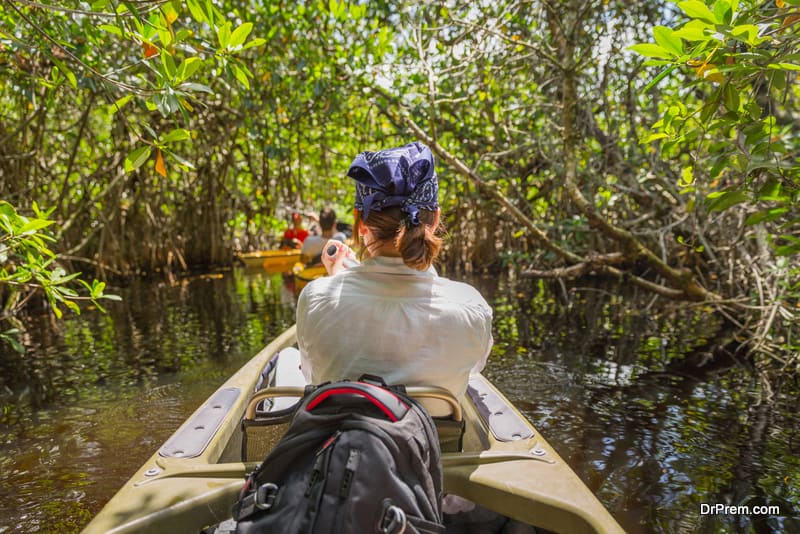
You can travel much of the distance in the park on your bike. You do not need any bus, plane or train to get to this destination. An amazing natural holiday experience, this place surely is a good alternative.
Thailand
Considered a tropical paradise, Thailand has some lovely green places to visit. Not only can you be a visitor there, but can also consider volunteering for the eco-friendly activities there. It is a perfect destination to pay homage to mother earth, where you can help develop the flora and fauna.
Top destinations around the world that are eco friendly
An eco friendly vacation does not always mean roughing it in the wild, there are many travel destinations that offer five star luxuries while being aware of the environment.
The first destination is the Guludo Beach Lodge that is located in the Quirmbas National park in Mozambique. Here you can enjoy long walks on unspoiled beaches, the underwater marvels, learn how to scuba dive and much more. The Guludo beach was built with the aim of using tourism as a platform to develop the poorer and more rural communities and 5% of the profits of the Guludo lodge go towards the Nema Foundations that over sees the community and conservations projects. The lodge is made using services and materials that are locally sourced.
Another green global vacation spot is the Jungle bay Resort in the Dominica, which is known for its natural beauty and hot sulfur springs. The eco friendly aspect of this destination is that it uses tourism to preserve the local communities and the environment. This Caribbean island is different from the others in that it moves away from the seas and beaches and draws attention on the nature based activities that promotes awareness of the forests and the other natural wonders of the Caribbean.
The Cradle Mountain Lodge in Tasmania offers a wilderness experience that is truly unique and is located right on the Cradle Mountain-Lake at the St. Clair national park. The lodge operates on an elaborate system that uses tourism and its revenues to conserve the natural fauna, flora and upgrade the natural tracks of the National park.
The White Pod resort in Switzerland is the best snow retreat that looks after the environment as well; here you will find tents shaped like domes through within you can experience the Alps in a low impact way. The lodge is only accessible through hiking during the summers, snow shoes and dog sleds.
The pods are put on wooden platforms and can even be dismantled and reassembled without creating a very big impact. The White Pod resort also uses energy sources that are renewable and the spa sources their materials from the natural, local resources. They have even been awarded for their innovation efforts in eco tourism.
If you are in British Columbia make sure you go to the Nimmo Bay Resort in the Great Bear forest, here you can enjoy rock climbing, hiking, fishing and kayaking in natural surroundings. The lodge is powered by a hydro system and also has refuge-elimination and extensive recycling.
Guide to top 10 ecotourism destinations in Europe, Americas and Asia for a new experience

Ecotourism is fast gaining pace in the environmentally deprived world today. The objective of eco-compatible excursions is to make the tourist aware of the importance of ecological conservation and other related issues. The tourists are taken to places that are relatively undisturbed by human intervention in comparison to the regular holiday destinations.
The top 10 eco-travel destinations of the world are discussed further.
1. Sweden
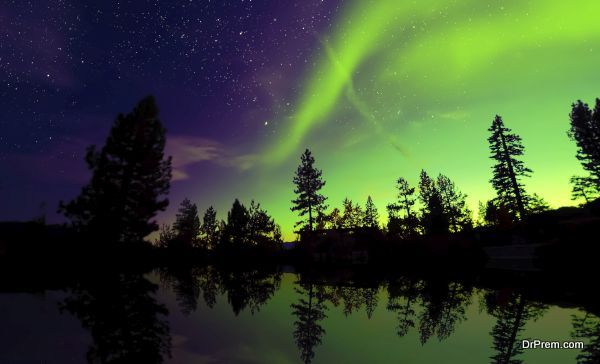
Sweden is one of the best ecotourism destinations of the world. If you are serious about having a quality ecotourism experience you should not miss out on this Scandinavian country that holds the ecotourism quality certifications, ‘Nature’s Best’, which was a unique certification in Europe during 2002, when it was first awarded to this tourist destination. The objective of the ecotourism activities of this place is to ensure that economical worth is added to resources of ecological and cultural importance. The tourists of this place are offered to view the most remarkable places of this country, while contributing to the cause of its ecological conservation and economy. The tours of this country are organized by government tourist organizations such as the Ecotourism Society of Sweden, which works on the motive of offering the best tourist experience of this place and promoting new ones, while enhancing the economy of this place with the revenues generated through such activities.
2. Gothenberg
Awarded Eco Tourism destination of the Year award in 2011 by the Business Destinations magazine, this location is guaranteed to provide you a hundred percent authentic ecotourism experience, as many of the facilities that you use for your stay or transportation are environmentally and sustainability certified.
3. Iceland
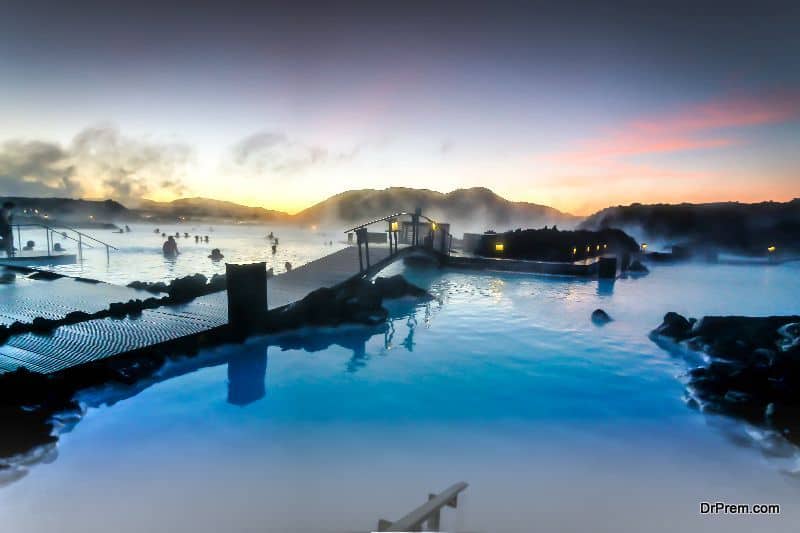
Iceland tops the list of eco tourism destinations, as its scores high on the sustainability scale. The administration emphasizes on the usage of clean energy and conservation. Tourists visiting this place are educated by the tourism officials about the importance of environmental sustainability, in the present times. This is an ideal tourist destination for a person who wants to witness breathtaking natural beauty along with eco-conservation education. In the process, one gets to experience natural phenomenon such as the Aurora Borealis. The Blue Lagoon and Gulfoss are the other scenic wonders that one should not miss here.
4. Austria
Though a trip to the naturally well-endowed Austria may prove to be expensive for people outside Europe, the prices are mediocre for the Europeans. The country, with its abundant greenery and clear blue skies, has a number of tourist destinations where ecotourism is available along with other holiday activities such as Skiing, History and Culture Tourism, and sight-seeing of important monuments.
5. Greece
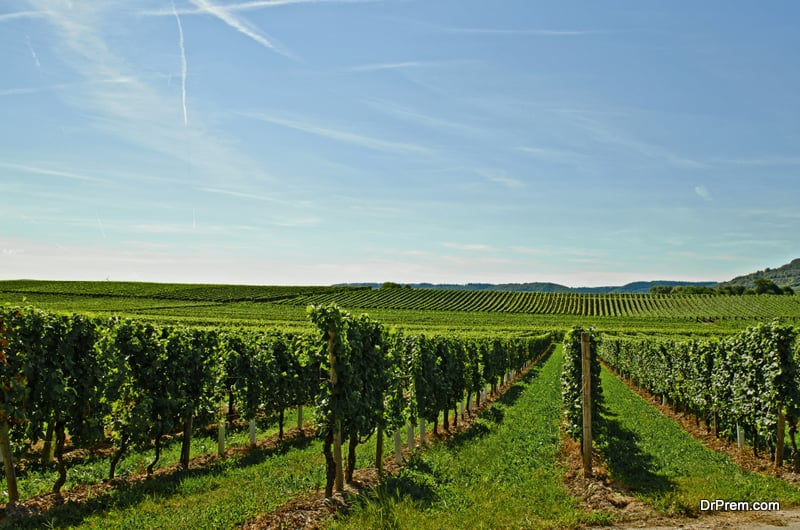
If your ecotourism has cultural and historical studies on the agenda, you can always opt for Greece, which has organized ecotourism excursions. Guided tours, organized by tourism administrators, take care of the entire educational trip of the tourists and ensure that they safely complete their trips.
6. Estonia
Estonia can be the dream destination of ecotourism enthusiasts who want to delve deep into forest life and study about the flora and fauna of forests. About half of this small country is covered with luscious forests and woods. Expect to meet some brown bears and wolves in these forests, the other prominent inhabitants of this region being eagles and the lynx.
7. Norway

This country, with its marvelous and varied landscape consisting of wildlife, snow-covered mountains, rocky fjords, and its virgin water bodies, is one of the most popular ecotourism destinations. If you are a true ecotourism and sustainability buff, you will not mind using the bicycle as a means of transportation during your excursion in this place, as bicycle is an eco-friendly mode of transportation.
8. United Kingdom
Endowed with 27 cultural heritage and scenically breathtaking locations, as per the UNESCO, the United Kingdom comprises England, Scotland, Northern Ireland and Wales. Though a well-developed tourist destination, some regions of the United Kingdom are naturally undisturbed. These can serve as excellent ecotourism destinations. Scotland’s Western Islands, with their sustainability and energy conservation consciousness, and the breathtaking charm of the virgin landscapes make one of the best choices for an eco trip.
9. Lapland

If you want to truly experience the serenity of being in the lap of nature, you should visit Lapland where you get to visualize rare natural phenomena such as the Midnight Sun and the Aurora Borealis. The untouched wilderness of this place provides an awesome experience.
10. Bosnia Herzegovina
The term Bosnia Herzegovina automatically brings up thoughts of terror and strife in the minds of many, but in the present times this place is fast emerging as one of the hot eco-tourist destinations of Europe and the world. If you are on the lookout for some eco-sport while on your stay in this place, think about white rafting which has emerged as the favorite eco-sport of this region, the beauty of which is based on the innumerable rivers that gracefully meander across the landscapes of this region.
Top 10 eco tourism destinations in Americas

Though ecotourism may be visualized as confined to remote regions of the world where native life and virgin landscapes dominate, the Americas have a lot to offer in terms of ecotourism, which constitutes a major chunk of its eco-tourism industry. Costa Rica, Venezuela, Colombia, Argentina, and Peru are some of the most important Latin American ecotourism destinations that have gained international attention in the field.
Belize, Nicaragua, Bolivia, Panama, Brazil, Chile, and Ecuador are other high-demand ecotourism destinations of Central and South America. Though scientifically advanced, USA cannot be left behind, in the field of ecotourism. Alaska, Hawaii, California, Colorado, Washington, Oregon, Montana, New York, Texas, and Maine are some of the locations which can be of interest to the eco-tourists.
The top ten ecotourism destinations of the Americas are discussed further.
-
Costa Rica
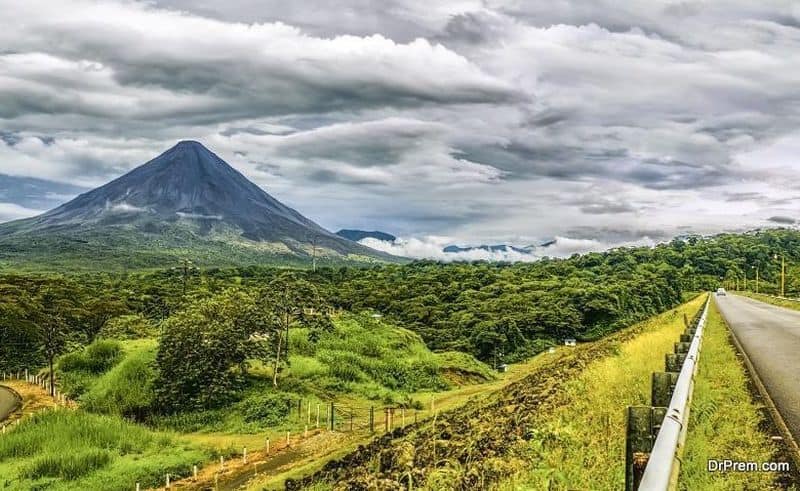
Costa Rica tops the list of Latin American eco-tourism destinations. The country has a number of Government-organized thriving programs on ecological sustainability. The Manuel Antonio National Park, with its virgin beaches, rainforests, and a range of wildlife, is a major attraction for both national and international tourists from around the world. This national park has earned a place for itself in the Forbes list of “World’s Most Beautiful National Parks” in the year 2011. Kayaking, horse riding, fishing and hiking are some of the adventurous activities that tourists can engage in.
-
Ecuador

Ecuador is one of the most thriving ecotourism locations of the world. The country is rich in its ecological resources and the government is taking adequate efforts to conserve them through ecotourism and environmental awareness programs. The national park at the Galapagos Islands is one of the parks where ecological conservation measures are strictly enforced. The involvement of big industry names such as Yachana in the environment conservation initiatives of the country has helped in rapid progress and prosperity of ecotourism in the region.
-
Brazil
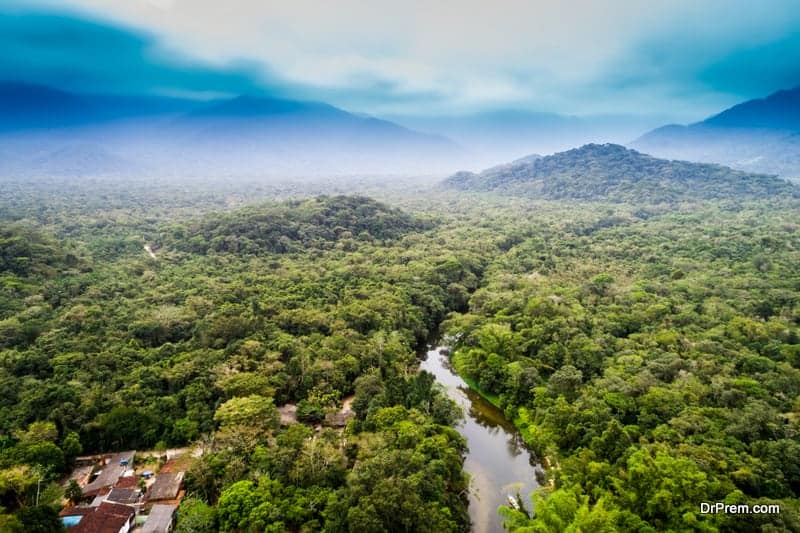
The ecotourism destinations of Brazil can be organized under certain major categories. The Amazon rainforest, covering approximately 3 million square kilometers of Brazilian territory, is the largest rainforest of the globe. Pantanal, the biggest wetlands of the world, also contribute to the eco-wealth of Brazil. The Atlantic Rainforest, of which only 10 percent remains today, was one of the magnificent rain forests of its times. Cerrado, comprising the Brazilian heartland, is the place for eco-tourists who want to experience the ancient ecosystems of South America. The vegetation at Caatinga, in the Brazilian backlands, is another attractive feature on your eco-tourism package.
-
Alaska
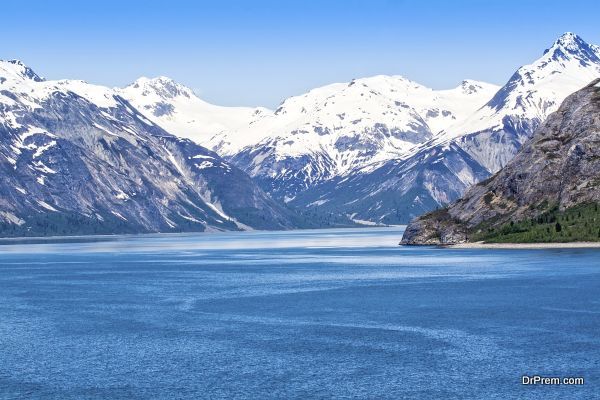
Alaska is a topper when it comes to the list of most preferred ecotourism destinations of the USA. The Alaskan government is serious about improving, maintaining, and promoting its sustainable tourism industry, and has successfully enforced a number of rules, regulations and norms to this effect. The stunning biodiversity of this region is its strongest point for attracting eco-tourists. Bears, whales, mountain goats, puffins, moose, and otters are subjects of eco-studies for the ecotourism enthusiasts. The highly accoladed Sadie Cove Wilderness Lodge is worth mentioning. Mount McKinley, Denali National Park, and Skagway are other tourist attractions of Alaska.
-
Guyana
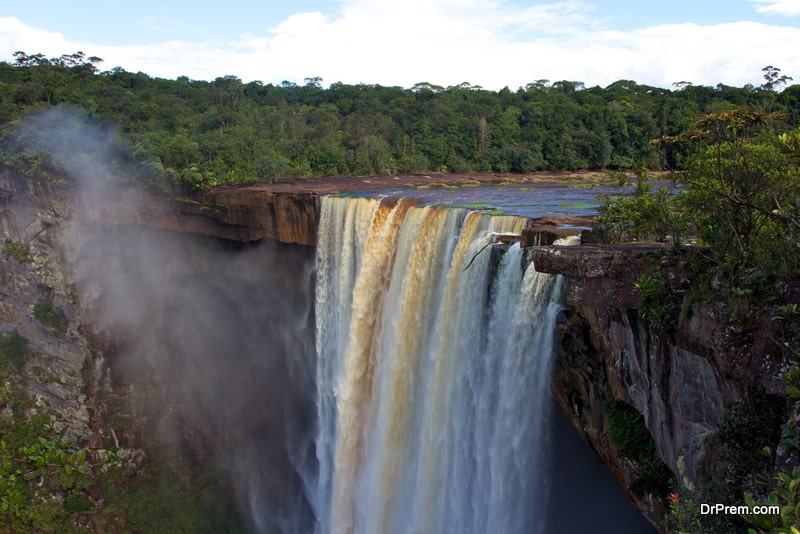
Guyana is fast developing into a popular ecotourism spot. The stupendous Amazon rainforests are a crowd-puller. The Kaieteur Falls, the largest single-drop waterfall of the globe, by volume, has visitors visiting in short trips of twenty four hours each. Next, the Kaieteur National Park is a region where you will be pleasantly greeted by toucans, golden tree frogs and macaws.
-
Hawaii

Hawaii is one of the best ecotourism destinations when your area of interest is the flora and of the ocean. The undersea volcanic activity of this tropical ecological hub is the main cause of its remarkable biodiversity. The Hawaii Volcanoes National Park is one of the most unpredictable geographic features of this region. You will come across many rare marine life forms such as the humpback whales. As you travel around this place, you will find barren lands as well as forests, and plain lands as well as mountainous regions.
-
Venezuela

The eco-richness of Venezuela is conveyed by the fact that the Canaima National Park ranks sixth in the in the largest national parks list of the world. This park has also been declared as the UNESCO World Heritage Site. This national park, with its luxurious greenery, and the Angel Falls, which is the biggest uninterrupted waterfall of the world, make an attractive ecotourism package.
-
Peru

Peru is one of the hottest ecotourism destinations of the world. Machu Picchu is the main attraction of this place. The amazing rock cuts of the mountains, the Incan ruins, and its rich bio-diverse flora and fauna make it a dreamland for many tourists. Sacred Valley organizes community tourism. You can enjoy bicycle rides through the Incan Ruins of Mornay.
-
California

California figures up amongst the top ecotourism sites of America. Surprisingly, San Francisco, which is one of the most urban cities of the state, offers adequate opportunity to the eco-aware persons to pursue eco-friendly activities such as cycling and walking. California offers about 125,000 jobs in the ecological development and environment conservation industry. The Aquarium of the Bay, the Golden Gate Park, and the Ferry Building marketplace have certain things of interest to the eco-tourists.
-
Colorado

The gigantic Rocky Mountains contribute to the major chunk of ecotourism of this region. It is divided in to a number of bio-zones which consist of their typical flora and fauna. The Rocky Mountain National Park offers a number of eco-sports. The Never Summer Mountains, the Longs Peak and the Milner’s Pass are the main attractions of this park. The UNESCO World Heritage Site, Mesa Verde and the Garden of the Gods State Park, El Paso County, are other invaluable assets of Colorado.
Top 10 Asian travel destinations every eco tourist would love to visit
Asia, with its climatic diversity and abundant greenery and water systems, is home to a large range of flora and fauna in its ecosystems. This makes some of the Asian countries, especially the Southeast Asian countries, remarkable eco-tourism destinations. Laos, Malaysia and Philippines are some of the locations that are internationally recognized as highly acclaimed eco-tourism hubs. Well-organized guided ecotourism is practiced in these countries. Some of the best Asian ecotourism destinations are discussed further.
-
Laos
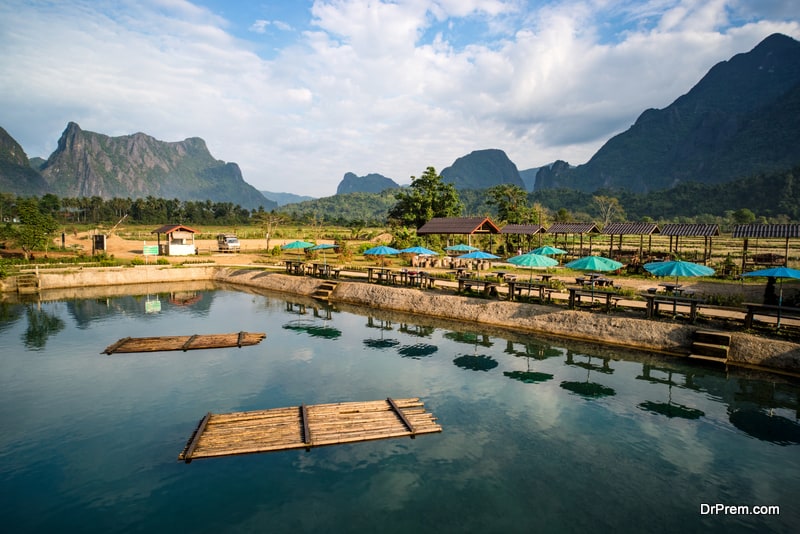
Laos is fast emerging as a major eco-tourism destination of Asia. Lauang Namtha, Khammouane, Luang Prabang, and Champassak are the ecotourism hotspots of this country. The Luang Namtha region has mountains that are relatively less explored in comparison to the regular tourist destinations. The Namha National Protected Area, tagged as an ASEAN Heritage Park, offers ample scope for the eco-tourists to study the cultural and wildlife aspects of the region. Laos is home to about 300 species of birds and 38 species of mammals, many of which are of the rare varieties. Kayaking, rafting, cycling and trekking are some of the eco-friendly sports that you can engage in. Bokeo is the home of black-cheeked gibbons and it has a forest camp program called the Gibbon Experience.
-
Malaysia

Malaysia is another hot Asian eco-tourism destination. East Malaysia, specifically Malaysian Borneo, is fast rising as a favorite international destination. The Sepilok Orangutan Sanctuary attracts visitors from every corner of the globe. Sabah opens up a 74.000 sq. km tropical jungle with its myriads of explorable wildlife. Remote rainforests and beaches are the other attractive natural features of this place.
You could try out a host of eco-sports such as trekking, diving (wall, macro, reef and wreck), and water sports. Sarawak, also known as the” Land of Hornbills”, is another East Malaysian destination that has a number of national parks. You can perform cultural studies on the indigenous inhabitants of the region. The Similijau National Park, the Niah Caves, the Kubah National Park, and a number of wildlife centers provide shelters to endangered species of animals. Sarawak is approachable by motor boats.
-
Philippines
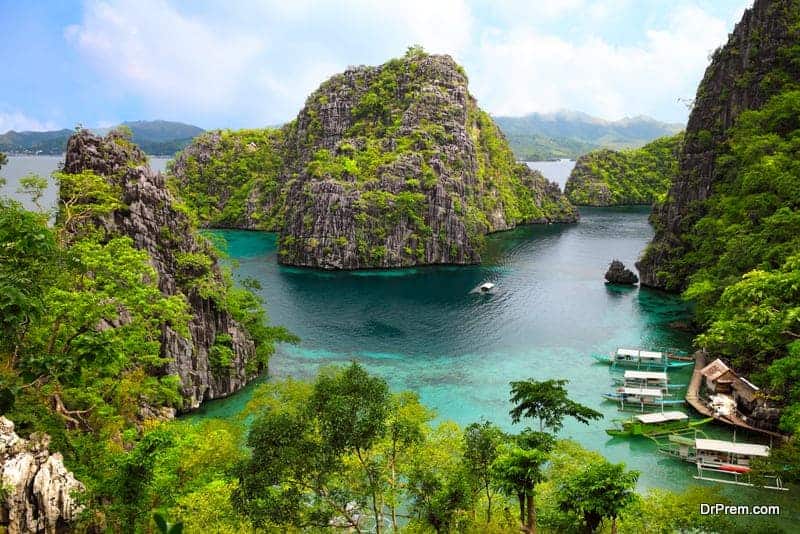
Philippines comes next on the list of the Asian eco-tourism toppers. Awarded the title of “Ecotourism Destination of the Year” in 2009, by a French travel company, it stands out amongst other Asian eco-tourist destinations. Palawan was recognized by the National Geographic Travel magazine as the most worthy East and Southeast Asian travel destination in 2007. This region consisting of 1768 islands ranks 13th on the list of islands with impressive landscapes and seascapes. The ecological conservation and sustainability consciousness of the place is indicated by its Biosphere Reserve programs. Bohol is an agricultural, fishing and handicrafts destination of this country.
-
Thailand
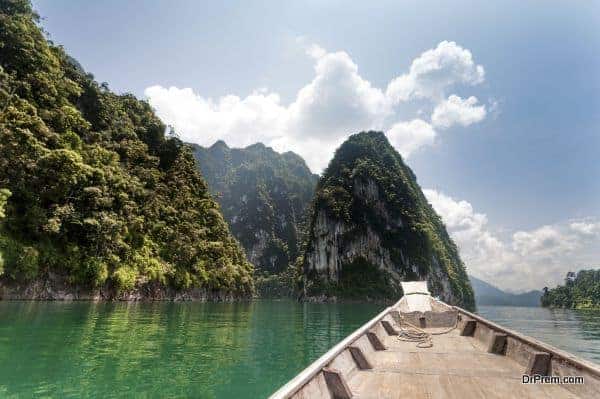
Thailand is a leader in the ecotourism sector. It has a number of regions that have gained prominence individually in the field. Surat Thani, with its limestone islands with jungle waterfalls, hidden caves, and abandoned beaches, and a variety of tropical flora and fauna, attracts a large number of travelers from across the world. Amongst the regular eco-sports, Nature Trail is an interesting activity that is offered by the national parks of the region. Chiang Mai is another Malaysian ecotourism destination with impressive natural landscapes, and wildlife. It has been chosen as the location for the PATA Eco and Adventure Conference where it was considered as an ideal location for ecological and adventurous activities. Koh Kong has a number of virgin jungles that are meant for exploration by adventurous eco-tourists. Chiang Rai should be your destination if you want to experience some out-of-the-world mountain and valley landscapes.
-
Vietnam

Vietnam is not all about political unrest. There is a brighter side to this country that is fast emerging as a tourism hub, especially as an ace ecotourism location. Ninh Binh, with its breathtaking landscapes, commendable national parks, and awe-inspiring limestone peaks, makes an ideal weekend retreat for adventure and relaxation. The Cuc Phuong National Park, with its stunning mountainous and forest landscapes, limestone mountains, cultural heritage, and rare wildlife species, requires special mention as it is the oldest Vietnamese national park and is visited by tourists from all over the world.
-
India
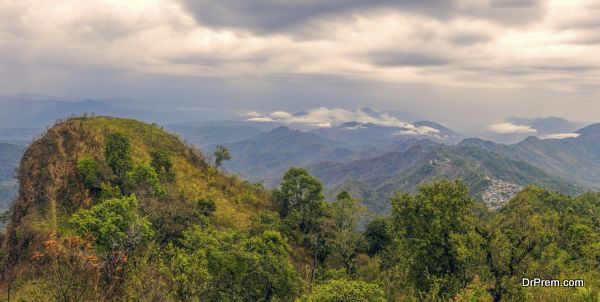
India is remarkably diverse in its climate, landscapes and wildlife. Mountains, desserts, river-plains, and forests are some of its greatest attractions. The rich cultural heritage of the country is one of the highly revered in the world. The ancient Indian historical, cultural and religious monuments have always been considered as one of the most remarkable in the world. The Sariska Tiger Reserve, in Alawar Rajasthan, which provides shelter to the endangered Royal Bengal Tiger, deserves special mention.
-
Cambodia

Cambodia is very impressively naturally endowed. Special mention must be made of its Mekon Discovery Trail which is an ecotourism program that aims at studying the flora and fauna of the Mekong river and the lands flanking it. As the Mekong is a long river, you may find independent programs for studying the ecology associated with this river, in small segments.
-
Indonesia

The Satwa Elephant Eco Lodge, Way Kambas National Park, Lampung, Sumatra is one of the best ecotourism national parks of this country as one can find the endangered Sumatran elephants, tigers and Rhinos here.
-
Kazakhstan

The ecotourism locations of this place hold eco-sporting activities such as skiing. The natural attractions, history and culture of this country are the major attractions of eco-tourism activities.
-
Maldives

The Maldives, with its host of unexplored beaches, is an attractive eco-tourism destination. Diving is a popular sport of this region. It is one of the expensive tourist spots of Asia.
Five Best Eco-friendly Trekking Destinations
There is no dearth of mountains and steep terrains around the world. You draw in immense pleasure as you scale the heights. It is healthy and does a lot of good to your physical and mental state. However, this form of niche tourism does not run on a one way traffic arrangement. As you have your healthy fun trek, the nature too expects its share of justice from you. Pollution and disruption of tranquility in the mountains need to be avoided while on a trek, which forms the basis of eco friendly treks.
1)Peru:
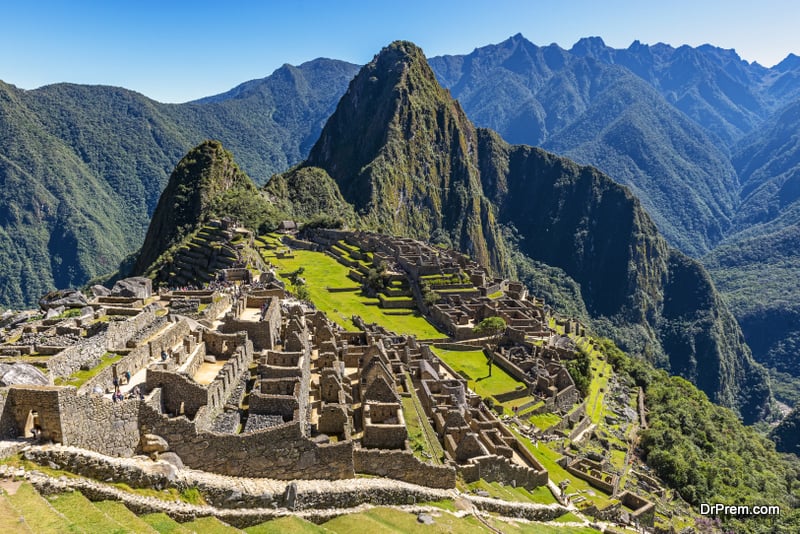
There is a great opportunity for eco friendly treks in the south eastern part of Peru, a country of stunning beauty perched in the grand Andes. Here, you can have sustainable and eco friendly treks with experienced tour operators. The money from tourists goes towards the growth of slum dwelling children of Cuzco. The transportation arrangements are nicely designed, and the porter fee structure is good enough to keep your luggage carriers smiling. The guides are experts in trekking techniques and first aid needs. Trekking gears like radio equipments, maps, oxygen tanks and first aid kits are of first rate quality. Guides escort you along the legendary Inca treaded tracks, and there is a strong emphasis on control on garbage disposal to ensure that the ecological balance is not disrupted. The porters are sturdy and loyal selected from Qachin-Lares and Cuper Alto Chinchero native neighborhood. They are always beaming and helpful.
(2)Garwal, India:
The Garwal Himalayas in northern India is known for its unparalleled beauty. The trek all the way is high voltage fun and yet it ensures a sustainable tourism where the ecological balance is struck and beneficiaries are the locals, the surrounding business establishments and the trekker himself. Here, you have the world’s loftiest mountain peaks, and eventually words cannot do justice to the exquisite landscape that lies in wait for you. Out of so many attractive Garwal trek routes, the ‘Har ki Doon’ stands way apart on account of its virgin remoteness and unspoilt pristine beauty. It is located in far up the region and has exotic meadows. The legendary valley of flowers is located right here. It is an Eden of breathtaking range of flowers. The tranquil and absolutely pollution free locale gives you a feeling that God himself must be staying over here!
(3)Alpine trek, Central Europe:

Trekking in the French, Swiss or Italian Alps could be a life time experience. The setting is gorgeous and the arrangements feature latest updates. Control on pollution and efforts to sustain ecological balance are at its best. Treks offer high adventure and tons of thrill up the terrain amid a clean and soothing milieu. The Mont Blanc area of Alpine France is a great trekking locale. The service of the professional trek guides is of high quality. The impact on the surroundings is not damaging. Switzerland is just another amazing Alpine trek paradise. The view is great and the landscape unblemished.
(4)Nepal:
Nepal, the country wedged between India and Tibet claims some of the loftiest mountain peaks of the world. Nestled in the majestic Himalayas, this exquisitely beautiful country has grand trekking opportunities. Treks in Nepal promote green tourism, and serious efforts are initiated by the tour operators to make the locals and trekkers conscious of environment conservation. Packaged treks are organized up the meanders and stiff terrains through beautiful snow capped peaks, valleys and along swirling cascades. The all time supreme voyage of Everest trek is a real challenge to the trekkers and only the sturdiest and battle hardened trek veterans can eventually make it. Other famous trek points are the Annapurna base camp trekking, Mustang trekking, Jomsom Muktinath trekking and Mansalu trekking.
(5)Trekking in the Rockies:
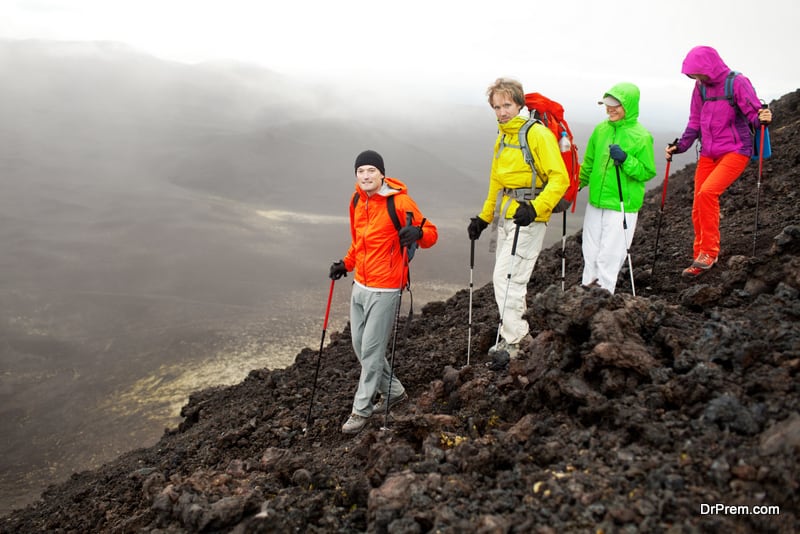
The Canadian Rockies present a great scenery and an adrenaline surging rock trek through pristine greenery cut across the mountainous terrain. As you progress on your fun trek, there is an opportunity to explore the Banff, Jasper and Wells Grey national parks having a diverse and rich collection of flora and fauna. All along your uphill ride you feel a great emphasis put on sustained trek aiming a minimum disruption of natures balance. The environment is unspoilt, and the treks are conducted by experienced and knowledgeable guides. They have their helping hand ever extended. It is an eco friendly dream trek exposure amid tranquil nature.
Is Oman the new destination for eco-tourism?
Oman may be a new comer as a tourist destination and not up to the competitive level when pitted against flashy Emirates and other Middle East countries. However, tourism industry is evolving giving the much-required support to its economy. Crude price shrinkage has compelled this country to take recourse to tourism as an alternate revenue earner.
Local flora and fauna have a huge potential for being the basic pillars of strength for a flourishing market of ecotourism as the government expects an increased influx of tourists from across the world with money flowing in like raindrops from the sky.
The unexplored Oman’s bio-diversity:
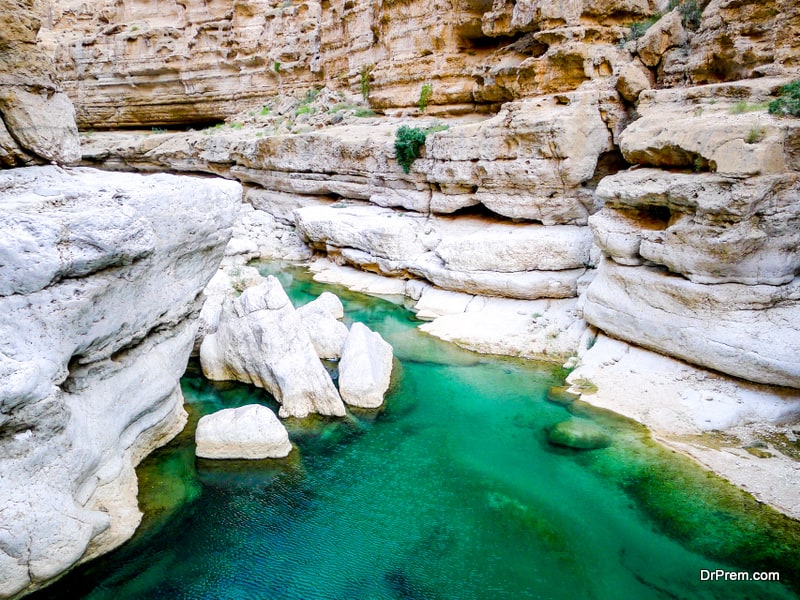
The desert country has many hidden green gems making it a perfect destination for ecotourism and related activities. Oman’s bio-diversity includes wildlife sanctuaries and coastal habitats covering an area of 30,000 Sq kilometers.
Coastal water on the reaches of the Indian Ocean is a haven for dolphins, whales and birds. Nearing the coast, the coral gardens teeming with fish are great tourist drawers. Endangered marine turtles find their safety habitats in the specially protected coves.
The mountains and deserts offer a shelter to rare animal species like Nubian Ibex, sand cats and obviously Arabian Oryx, the iconic species of the Gulf. The land ruled by absolute peace, Oman is poised to offer international travelers a new facet of leisure tourism apart from opportunity of exploring ancient ruins scattered all over the region.
Ecotourism ventures:
The country is committed to upholding sustainable tourism through proper conservation of its splendid natural and geological habitats amidst the secret beaches and islands, luxuriant oases and hiking trails.
Trekking and hiking in Al Hajar mountains:

Hotels and resorts promoting sustainable eco-tourism are coming up providing a varied attraction to the nature lovers and die-hard adventurous souls. Al Hajar Mountains, with a rich treasure of flora and fauna, offers exciting hiking and trekking opportunities.
The 300-year-old shepherd’s village is arousing curiosity among the travelers who happily put up in a hotel constructed from the stones of this age-old human settlement.
Fostering eco-tourism, this hotel uses its own water resources, taps solar energy for power and buys local produces to satisfy the appetite of the guests. The ghostly trail amidst the eerie stillness creates a supernatural ambience imparting a totally different experience.
Rose farming:
Rose farming in Jebel Al Akhdar, one of the loftiest peaks in Arabian Peninsula, has also been gaining tourism interest. The famous pink velvety blooms are used for rose water production, which is an important mean of livelihood for the locals.
The locals follow the century-old process of rose water extraction which helps in preservation of quality. Omani rose water finds wide application in food items and household purpose.
Ecotourism in Bandar Khiran:

The site famous for coastal cliffs and narrow beaches houses a thick population of mangrove forests, sand and mud flats and amazing coral reefs is an upcoming eco-tourism spot supported by The Oman Tourism Ministry and IUCN’s regional office, West Asia.
The marine biodiversity of Bandar Khiran is no less interesting with white-cheeked terns, sooty falcons and green and hawksbill turtles adding to the pleasure of tourists. The unexplored archeological sites and water-skiing opportunities in sheltered bays further add to the excitement of visitors.
The efforts are on to develop this site for sustainable eco-tourism upholding the interests of the locals along with providing great vacationing opportunities for international travelers. Care is taken to avoid any sort of conflict between the locals and tourists in terms of tradition and cultural values. Visitors will also be forbidden to indulge in any environment harming activity.
Ras Al Hadd Project:
In another joint venture of developers and investors from Oman and Qatar supported by the Tourism Ministry of Oman and the Government of Sultanate of Oman, an eco-themed tourism project is coming up in South Al Sharqiyah Governorate featuring high end hotels and resorts amidst a natural bio habitat.
The project estimated $649 million covering 1.8 million square meters will be completed in several phases. This massive project is a clear indicator of the Omani government’s initiative to position the country as one of the famous eco-tourism destinations providing the visitors with a stunning insight of the splendid flora and fauna of this region which would further create more favorable tourism ventures in future.
Hotels, resorts
11 most eco friendly hotels of the world
Vacations refresh you and make you ready to face the world again. When you plan a vacation, you can choose to stay at some luxurious but eco friendly hotels. These hotels follow sustainable practices, have installed energy efficient cooling, heating and lighting and other green practices. Whether you want to lie in the sun on the beach, or spend nights gazing at the sky on starry nights, there are amazing environment friendly hotels all around the world you can do that in. Check out some great green hotels you can choose from:
11 best eco friendly hotels
Proximity Hotel, North Carolina

Image Source : proximityhotel.com
It’s one of the best eco friendly resorts you could visit. It is platinum rated by LEED and has 147 rooms. The hotel also has hundred solar panels installed on the roof. The elevator in the hotel generates geothermal energy used by the hotel’s refrigerators. Ingenuous and incredible eco friendly ideas abound in this resort, along with the luxurious rooms and beautiful courtyard. The creek side terrace is fantastic and you can spend time in the European bar and bistro there. You can borrow bikes from the hotel to explore the city in an eco friendly transport.
Oyster Box, South Africa
If you’re planning a trip to Durban, you can stay at the Oyster Box. This is one of those eco friendly hotels, which are environment friendly in most aspects. It has water management, water treatment and water recycling systems along with an efficient waste management system and solar power.
Al Natural Resort, Panama

Image Source : alnaturalresort.com
Tucked away in Boscas Del Toro in Panama, this resort is a fabulous example of eco resorts. The seven bungalows have thatched roofs, solar power, orthopedic mattresses and unique open walls, which you can open and close at will. This is the perfect retreat where you can de-stress and leave the entire daily worries behind. Yoga and scuba diving instructors will help you relax and have fun. Plus, the meals are served at a communal table which makes it easier to mingle, while enjoying the delicious food.
Eden Lodge, Madagascar
This lodge was built to promote eco tourism in Madagascar. It is located in between the forest and the beach, with tent like accommodation. The material of the tent is recycled, and waste and water management are some of its eco friendly features. You can experience the beauty of nature during your stay at Eden, as you enjoy looking at the magnificent sunrises and sunsets over the ocean.
Acajou Resorts, Seychelles
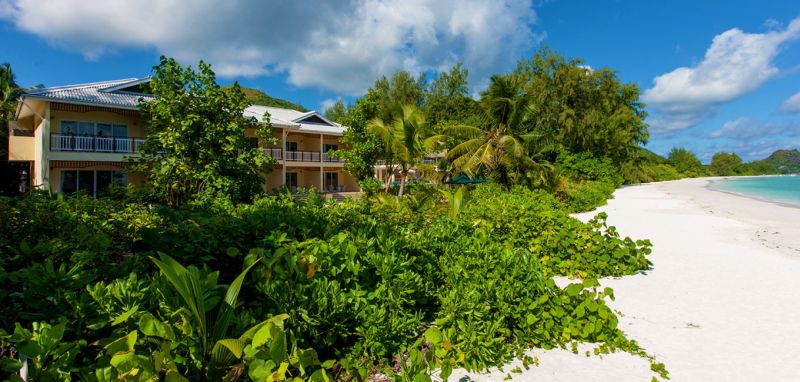
Image Source : acajouseychelles.com
This is one of the eco resorts, which have a rustic appeal to it. It’s close to the famed Cote d’Or beach located on Praslin island. The décor consists of timber and wood; gives the place a natural feel. Solar power, eco friendly waste management and a vegetables, fruit and spices are grown on the resort contribute to the green factor of the resort.
El Mangrove, Costa Rica
Spa bungalows, private gardens, an immense pool and hammocks in your room – how good does that sound? The EL Mangrove has 85 luxurious suites making it spacious eco friendly hotels you can plan your stay in. You can choose the resort’s all-inclusive beverage and meals option, which means you don’t have to bother about bills the entire time you’re there. That’s also quite de-stressing. EL Mangrove has many community initiatives, such as English classes for local children. Cleaning up the beach and donating organic waste is another commendable effort by the resort.
H2H hotel, California

Image Source : wa2.jetcdn.com
Eco friendly hotel ideas are plenty at this hotel. The grass roof is curved helping to filter the rainwater. The rooms are stylish, with green living elements such as bamboo flooring, chemical free bathrobes and rugs to accentuate the eco friendly experience. Enjoy the spa, Jacuzzi and the peaceful patio. The urban chic décor too is quite impressive. Eco friendly hotels such as this one, inspire their guests to follow the eco lifestyle when they’re back home.
North Island, Seychelles
It’s THE resort for serious greenies. You’d love this resort if you’re into conservation initiatives when you’re not relaxing in the pristine beaches. Participate in the Noah’s Ark initiative, which aims at preserving the wildlife species and indigenous plants of the islands. Eco friendly hotels like these are doing their best to inculcate a feeling of love for nature in their guests.
The Brando
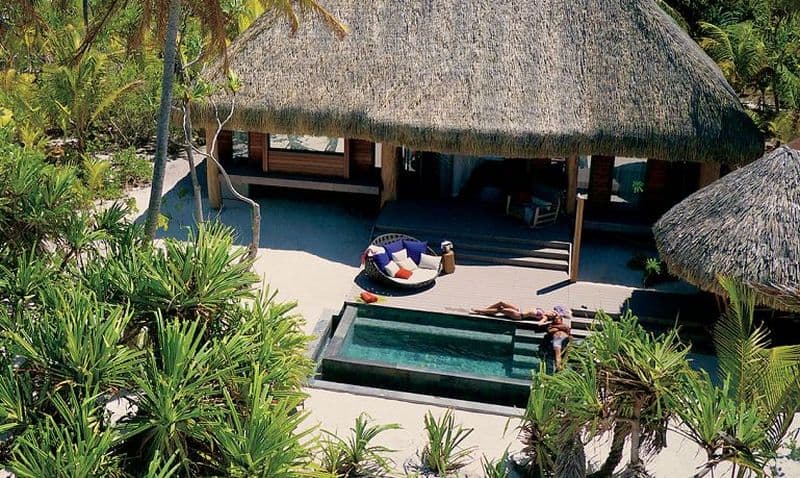
Image Source : thebrando.com
Named after the legendary Hollywood actor Marlon Brando, this eco resort is amongst the foremost eco hotels in the world. The resort boasts of being carbon neutral and is almost completely self-sustainable. The materials used to construct the building were all of certified or local origin, or recycled and renewable. The air-conditioning system is driven by seawater, and the hotel is run on coconut oil and solar power. Even Barack Obama took a vacation at this amazing hotel.
Skybeds, Botswana
For those who love to spend time outdoors, going on a safari would be a great idea. The Skybeds are eco friendly hotels, which are actually buildings, set on 3-story platforms. The hotels are situated right in forest reserve’s middle. You can watch wildebeests, elephants, lions, deer and many more wild animals come and drink water at the watering hole. You’d be completely disconnected with the outer world, and be more in touch with your own self. The sister camp of Skybeds, Sable Alley has upscale tents, with private verandahs and outdoor showers. The camps have put in place several green practices, such as solar electricity, water treatment solutions and sustainable bath accessories.
Azura, Mozambique

Image Source : azura-retreats.com
One of the best eco friendly resorts in the world, Azura’s villas were built by the local people. The design is quite modern and the construction materials used were eco friendly. This is the kind of hotel you’d like to spend time in and relax without a care. From eco- detergents to solar power, this resort has many eco friendly features.
All these hotels and resorts can inspire eco friendly hotel ideas in hoteliers all over the world. So plan your holiday in an environment friendly resort, where you can unwind while supporting the planet.
7 Unique and Inspirational Eco-Friendly Hotels In The World
Conscious travel to keep planet earth clean and green is growing. Going by this contemporary rage, hotel selection focuses on elements ensuring a sustainable travel experience, leaving a minimum carbon footprint. To cater to the growing demand of conscious travelers, various hotels are coming up with innovative ideas. These hotels are emphasizing over energy efficient lighting, special acoustics, and thermoregulation systems. Here we list few great inspirational eco-friendly hotels in the world that promise you an eco-friendly stay.
Marataba Trails Lodge – One of the leading inspirational eco-friendly hotels in the world:

Image Source: marataba.co.za
Located in Marakele National Park, South Africa, this hotel is set amid serene wilderness far from the city grind. Just at a short drive from Pretoria, one would discover a unique mix of eco-friendly hotel ideas in this lodge. You have the canvas roof over your head with an unrestricted view of waterfalls, dales, and Marakele National Park. Not far from the lodge lie the attractive sites of Kransberg mountain ranges. Accompanying it are the remains of the Iron Age civilization that once thrived. Power is drawn from the sun aborting any chance of carbon emissions.
Hoshinoya Karuizawa- Nagano Prefecture, Japan – A premier energy-resort:
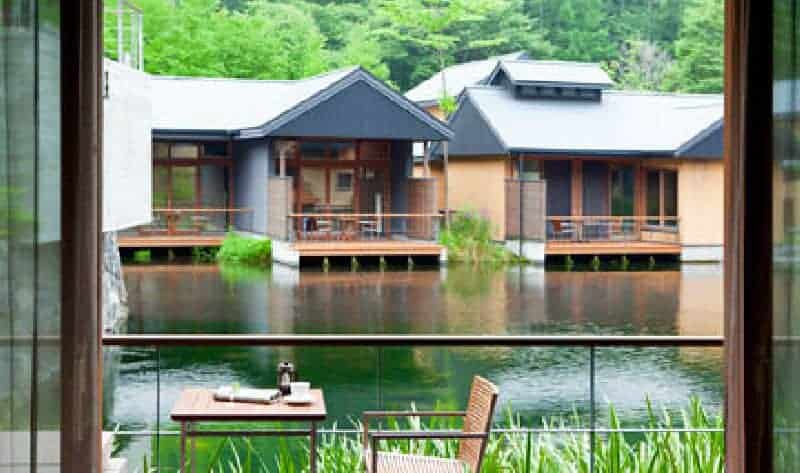 Image Source: hoshinoresorts.com
Image Source: hoshinoresorts.com
Located near Tokyo, one can easily count this hotel as one of the most inspirational eco-friendly hotels in the world. The resort has earned a special fame for the Hot Spring bath which enabled many notable writers by bringing out their creative best. The hotel’s design and decor amalgamate seamlessly and beautifully with the environment. It all happens with a touch of class and finesse.
High ceiling windows, neutral colors, and unbroken lines captivate your attention. Natural indoor stone bath and sauna, as well as an open-air bath, gratify your senses throughout the vacation. A recent addition has been a communal bathhouse fed by mild alkaline water. You are embraced by an idyllic setting inspired by century-old trees and the flowing river rising in the distant Mt Asama.
Hix Island House, Vieques, Puerto Rico exemplifying sustainable lodging:
 Image Source: hixislandhouse.com
Image Source: hixislandhouse.com
Taking into account the emergence of quality sustainable hotels around the world, Hix Island House would rank pretty high. Located far away from the bustling capital city of San Juan, the property is an ideal abode showering you with all goodness that nature has in store. Conceptualized by the master architect John Hix, every living quarter (or casas) is strategically constructed to tap the cooling effects of the blowing trade winds. His mind-blowing eco-friendly hotel ideas are reflected in the usage of natural bounties for construction and the solar-powered guest house Casa Solaris. Opportunities exist for attending outdoor yoga-classes right amid the unspoiled nature.
Proximity Hotel (North Carolina) – The greenest hotel in the US:
 Image Source: proximityhotel.com
Image Source: proximityhotel.com
Undoubtedly, Proximity Hotel has to be counted amongst other inspirational eco-friendly hotels in the world. Located in Greensboro, the hotel features 100 solar power panels on its terrace, an elevator serving the twin purpose of transport and generating power, and geothermal energy for the freezer too! This 147 room LEED platinum rated hotel is simply a vacation excellence of epic heights.
The rooms and suites are built in a loft style with floor-ceiling casements allowing enough light and air. In-room dining facility, filtered air systems, soaking tubs and a plethora of artwork from local talents are other notable features highly appealing to the guests.
H2H Hotel, California, US exemplifying eco-friendly built:
 Image Source: stylist.co.uk
Image Source: stylist.co.uk
This hotel has stunning tourist popularity for its unique eco-friendly design. Innovative eco-friendly hotel ideas have gone into the creation of the concave roof coated with a dash of greenery through which ambient light seeps in. The water in the swimming pool and heating systems installed in 36 elegant rooms are all thermally treated by rooftop solar panels. Rooms are furnished with tasteful decor where bamboo flooring, chemical-free rugs, and organic bathrobes inspire a healthy and hygienic stay.
Andaz Maui at Wailea Resort, Hawaii epitomizing luxury amidst sustainability:
 Image Source: maui.andaz.hyatt.com
Image Source: maui.andaz.hyatt.com
Hawaii’s first LEED approved hotel radiates ultimate luxury. This makes it truly one of the most inspirational eco-friendly hotels in the world. Located on the crescent shores, this hotel features a sustainable design-excellence with serious emphasis on waste reduction, controlling detrimental radiations, and energy and water conservation. Solar panels, motion sensor lighting controls, and paltry flow plumbing devices are all installed to set the seal on an inspirational and eco-friendly stay.
Song Saa Private Hotel, Cambodia committed to sustainable development:
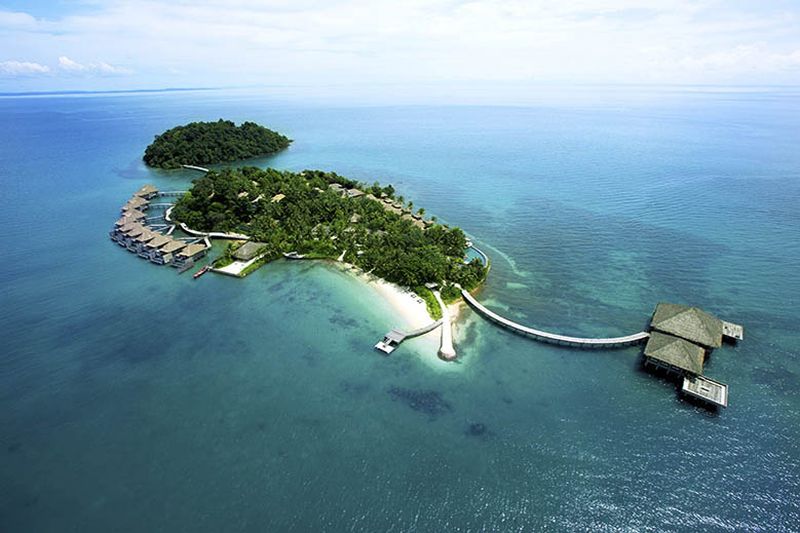 Image Source: s3.amazonaws.com
Image Source: s3.amazonaws.com
This eco-friendly hotel with 9 stunning overwater villas, 18 garden and beach villas justifies its name meaning ‘The Sweethearts’. The visionary owners, highly committed to environmental sustainability envisaged this cozy stay, which is famed for its impeccable service and delectable cuisine. Song Saa, with a great assortment of overwater bungalows, honeymoon resorts, and beach retreats in Asia also promotes projects like building a solid waste management center for the wellbeing of the surrounding communities.
Eco-friendly resorts that are a must visit
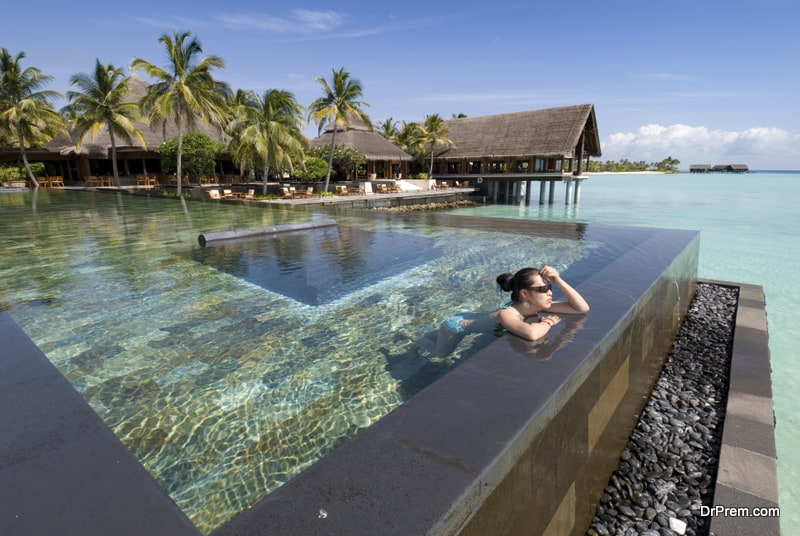
A vacation without creating harm to the Earth – doesn’t this seem to be an amazing concept? These eco-friendly concept vacations are slowly gaining popularity. Rather than spending huge amount of money on hotels, people are opting for tents, nature resorts, beach side rooms, forest tree houses, etc. These use natural energy like solar, tidal or wind energy to source essentials needed for our everyday activities. These are not only good for the nature, but also sometimes made from recycled activities.
Some of the best costal vacation resorts are mentioned below:
Sadie Cove Wilderness Lodge (Alaska)
This inn is located remotely in Alaska and comprises of not more than five cabins. They use natural sources such as wind and water to create wind power and hydropower. The water coming from the mountain is utilized at its best. The rooms here are available at $425 per person every night. This is a meal inclusive package. Enjoy the snow-packed wilderness in the midst of the coldest region of the planet.
Sal Salis Ningaloo Reef (Australia)
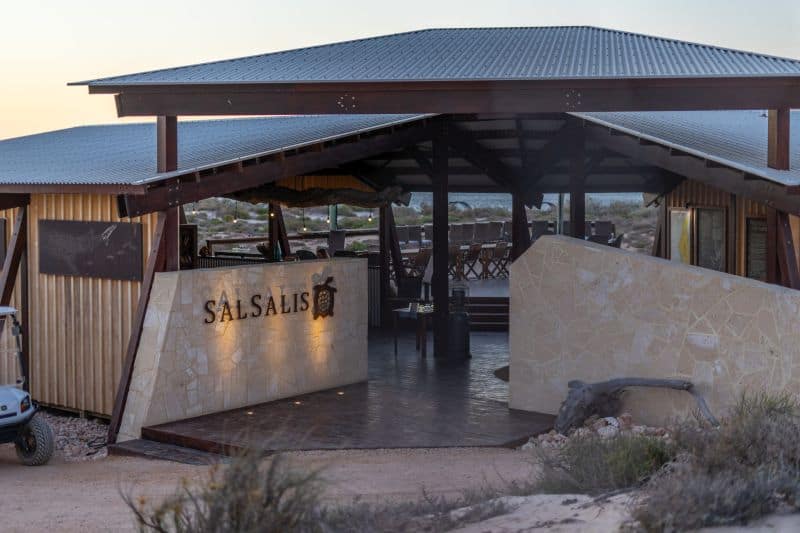
Image Source : salsalis.com.au
Enjoy the wild life kangaroo safari at Australia and stay in eco-friendly tents. These tents are well equipped by solar power and toilets. These toilets use composting method, rather than the water-flush modern method. The rooms are available at $900 for a couple per night. This package includes meals and outdoor activities.
9 beaches (Bermuda)
Located near the ocean, even if the sun is scorching hot, the seawater keeps the atmosphere cool and pleasant. The rooms here do not have air conditioning and are charged at $280 per night, while the cabanas built over seawater costs $490 per night. Choose an option you would be comfortable with, and enjoy the ocean day and night.
Treebones Resort (California)
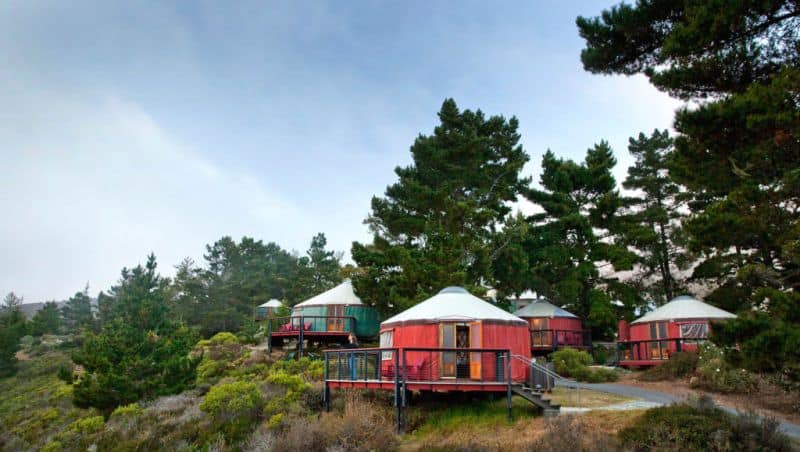
Image Source : treebonesresort.com
Located at Big Sur, California, this place is spread across the Los Padres National Forest and the giant Pacific Ocean. It comprises of Yurts, which are available at a cost of $155 every night for couples. These yurts provide queen sized beds, and have a flooring made of pine. You can enjoy nature activities like trekking, hiking or kayaking.
Yediburunlar Lighthouse (Turkey)
This inn comprises of solar panels for energy, and recycles its waste. You can engage in activities like learning Turkish cuisine or enjoy cruise fun. It comprises of not more than six rooms and cost $1650 for a week. This package includes flights from London and some meals too.
Important things you should consider as an eco tourist

Do you love the concept of eco-tourism? Want to travel around the world as an eco-tourist and promote environmental awareness among people? Well, here are a few important things that you should consider for this purpose:
- Keep your Load Light: The first and foremost thing that you need to keep in mind is to pack light. It not only helps you save your pocket but also adds to the fuel efficiency of the transport vehicle you are traveling in. Items, which can be washed and dried easily and multiple times, are always good for using throughout a trip.
- Opt for Recycling or Reuse: As a responsible eco-tourist, you have to minimize the use of polythene or other similar products. Rather go for recycled or reusable items. Nowadays, a number of companies are coming up with products that are free from BPA (Bisphenol A), a chemical present in polycarbonate plastics. Switch to those as and when possible.
- Try to Save Energy: It is one of the most important parts of eco-tourism. By reducing the consumption of energy, you can easily add to the conservation of non-renewable resources. So, make sure that you have turned off all electronic appliances while leaving the hotel or resort.
- Try to Save Water: Saving water is another big aspect of eco-tourism or sustainable tourism. Do not waste water by taking shower for longer time. Also, do not use much water during brushing teeth or washing clothes.
- Keep the Place Clean and Beautiful: If you want to explore the beauty of the nature in right way, you have to take proper initiative to keep the site clean. Do not disturb the quiet and peaceful wildlife or cause harm to the flora and fauna present at the place. Always keep a storage bag handy. It will help you trash all your disposable items and maintain the cleanliness of the area.
- Shop in a Wise Manner: There will be lots of exclusive products and items available in different places. But you have to be smart enough while picking them up. It is good to go through the label prior to purchasing any product.
- Learn New Things: While visiting a place, try to absorb yourself in the culture, tradition and customs inherited by local people. Learn about their lifestyle, food habits, music, and so on. This way, you will be able to identify the cultural and social differences, which have made the place unique from yours.
Do’s and Don’ts During Ecotourism

Some basic do’s and don’ts of eco-tourism are listed below:
Do’s
 Carry back all non-degradable litter such as empty bottles, tins, plastic bags etc. These must not
Carry back all non-degradable litter such as empty bottles, tins, plastic bags etc. These must not
![]() litter the environment or be buried. They must be disposed in municipal dustbins only.
litter the environment or be buried. They must be disposed in municipal dustbins only.
 Observe the sanctity of holy sites, temples and local cultures.
Observe the sanctity of holy sites, temples and local cultures.
 Cut noise pollution. Do not blare aloud radios, tape recorders or other electronic entertainment
Cut noise pollution. Do not blare aloud radios, tape recorders or other electronic entertainment
![]() equipment in nature resorts, sanctuaries and wildlife parks.
equipment in nature resorts, sanctuaries and wildlife parks.
 In case temporary toilets are set-up near campsites, after defecation, cover with mud or sand. Make
In case temporary toilets are set-up near campsites, after defecation, cover with mud or sand. Make
![]() sure that the spot is at least 30 meters away from the water source.
sure that the spot is at least 30 meters away from the water source.
 Respect people’s privacy while taking photographs. Ask for prior permission before taking a
Respect people’s privacy while taking photographs. Ask for prior permission before taking a
![]() photograph.
photograph.
Don’ts
 Do not take away flora and fauna in the forms of cuttings, seeds or roots. It is illegal, especially in
Do not take away flora and fauna in the forms of cuttings, seeds or roots. It is illegal, especially in
![]() the Himalayas. The environment is really delicate in this region and the bio-diversity of the region
the Himalayas. The environment is really delicate in this region and the bio-diversity of the region
![]() has to be protected at all costs.
has to be protected at all costs.
 Do not use pollutants such as detergent, in streams or springs while washing and bathing.
Do not use pollutants such as detergent, in streams or springs while washing and bathing.
 Do not use wood as fuel to cook food at the campsite.
Do not use wood as fuel to cook food at the campsite.
 Do not leave cigarettes butts or make open fires in the forests.
Do not leave cigarettes butts or make open fires in the forests.
 Do not consume aerated drinks, alcohol, drugs or any other intoxicant and throw bottles in the wild.
Do not consume aerated drinks, alcohol, drugs or any other intoxicant and throw bottles in the wild.
 Do not tempt the locals, especially children by offering them foodstuff or sweets. Respect local
Do not tempt the locals, especially children by offering them foodstuff or sweets. Respect local
![]() traditions.
traditions.
 Polythene and plastics are non biodegradable and unhealthy for the environment and must not be
Polythene and plastics are non biodegradable and unhealthy for the environment and must not be
![]() used and littered.
used and littered.
As a traveller, you will have an impact on the environment and culture of the place you are visiting. Here are some rules of thumb to make this impact positive!
Tips to make your travel as green as possible

Traveling green is not easy. But it isn’t necessarily impossible either. If you follow a few basic rules, you can ensure that your travels are green and as eco-friendly as possible.
Pack cloth handkerchiefs
One of the biggest contributors to trash in popular tourist destinations is paper towels, wet wipes and face tissues. If you are traveling to a hot and humid destination, pack a set of cloth handkerchiefs or hand towels to wipe your face and hands. You can have these laundered at your hotel or just wash them in your room with mild detergent and an antiseptic liquid.
Do not shop for necessities at the destination

Pack almost every possible thing that you would need at a destination instead of going shopping for it there to avoid packaging waste.
Avoid packaged snacks and bottled water
Packaged snacks and bottled water are the second biggest cause of litter at tourist destinations. Research local eateries that maintain a high level of sanitation and hygiene where you can stop and have a snack or meals served the traditional way.
Carry washable lunch boxes, thermos and your own reusable water bottles

If you want to be extra cautious and reduce your travel trash, you can always carry your own reusable water bottles, thermos and lunch boxes and have them filled with filtered drinking water, beverages and snacks from your hotel or eateries that you deem hygienic and “safe”.
Don’t litter
To make your travel as green as possible, you need to ensure that you don’t litter. Deposit trash only in trash bins and ask around for recycling bins to deposit bottles and other recyclables.
Take the least polluting public transport

Some places in the world offer zero- or low pollution public transport options like rentable bicycles, horse driven carriages and carts, cycle rickshaws and even CNG-run cabs. Research the greenest public transport and use it as often as you can.
Travel with a group
If you are traveling through a region that doesn’t have too many eco-friendly transport options, you can always book your travel with a group. You would thus be able to reduce your carbon footprint by sharing cabs and even rooms as needed.
Carry a navigation device

Going off the charted route may be the essence of traveling but when you’re using a taxi or hired car to do so, it could also add to your carbon footprint. Carry an efficient mapping/navigation device with you. This will help you create and follow travel routes more precisely thus allowing you to save time, money and emissions.



